When Hygienists Have Ownership
Peak Dental Services believes its path to ownership for dental hygienists will benefit team members, the organization and patients. p24
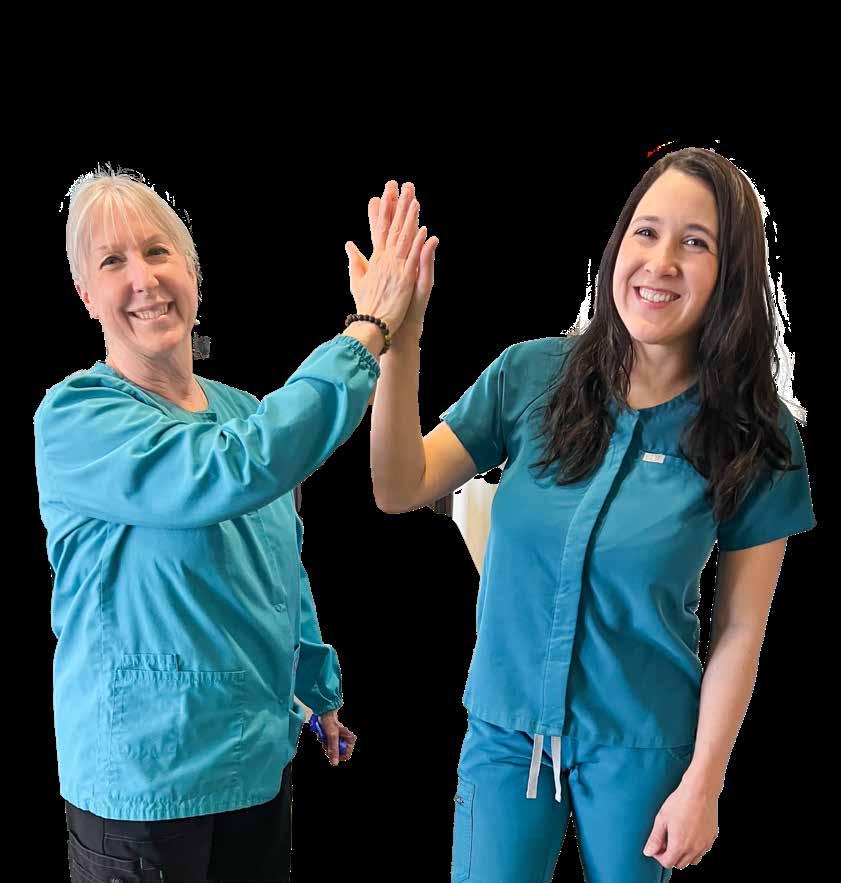

Silent Obstacles
What challenges are keeping more women from leading, and how to overcome them p16
Women Leaders in Group Dentistry
The hopes, dreams, challenges, and experiences, of successful female DSO leaders p30
Living a Balanced Life
Choose each moment with purpose, knowing that it can only be filled once p46
MARCH/APRIL : 2023 DENTALGROUPPRACTICE.COM
VivaScan®
Angela Severance Customer Success Manager I Ivoclar I Amherst, NY
”The past 15 years of my career have been solely focused on digital dentistry and patient satisfaction. I understand firsthand how important education and clinical support is when implementing this new technology into a restorative workflow. I have leveraged this experience as a digital dental assistant and worked closely with Ivoclar to create a unique, personalized customer service experience to ensure your DSOs digital implementation success!”

• Gain practice efficiencies
• Receive dedicated customer support


• Delight your patients, grow your business
Schedule a hands on demo today!

©2023 Ivoclar Vivadent, Inc. Vivascan and Ivoclar are trademarks of Ivoclar Vivadent, Inc. Rev.1
ivoclar.com Making People Smile
An easy way for your DSO to make a great impression
MANAGING EDITOR
Graham Garrison ggarrison@sharemovingmedia.com
SENIOR EDITOR
Daniel Beaird dbeaird@sharemovingmedia.com
ASSOCIATE EDITOR
Pete Mercer pmercer@sharemovingmedia.com
CIRCULATION
Laura Gantert lgantert@sharemovingmedia.com

ART DIRECTOR
Brent Cashman bcashman@sharemovingmedia.com
EDITORIAL BOARD
Dr. Eric Roman, DEO
Josey Sewell, DEO
Rachel Shipley, DEO
Hilda Gonzalez, DEO
Cassidy Parker-Knight, DEO
PUBLISHER
Jake Puhl jacobpuhl@deodentalgroup.com

VP OF
Amy
When Hygienists Have Ownership
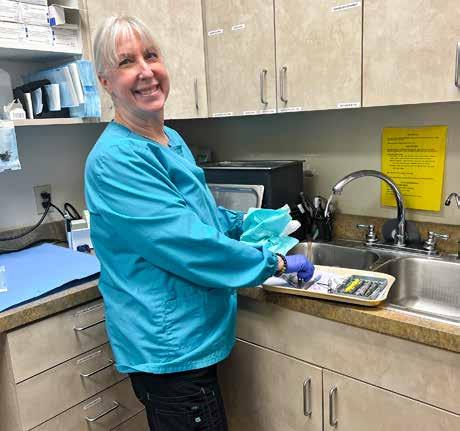
All rights reserved.
POSTMASTER: Send address changes to info@dentalgrouppractice.com.
If you would like to subscribe or notify us of address changes, please contact us at the above numbers or address.
The opinions expressed in this publication are those of the authors. They do not purport to reflect the opinions or views of the Dentist Entrepreneur Organization, LLC, DEO Dental Media, LLC, or DEO Magazine. Also, the information in this publication is meant to give readers general information that they may find of interest. It is not intended to substitute for compliance, audit, advisory, tax, legal, or other professional advice. Readers should consult with appropriate professionals before making a decision to use any of the material presented in this publication.
Please note: The acceptance of advertising or products mentioned by contributing authors does not constitute endorsement by the publishers. Publishers cannot accept responsibility for the correctness of an opinion expressed by contributing authors.
DENTIST ENTREPRENEUR ORGANIZATION • MARCH/APRIL 2023 1 dentalgrouppractice.com DEO Magazine is published six times a year by DEO Dental Media LLC, 501
150, Austin, TX, 78701.
2023 by
Dental Media LLC
Congress Avenue, Suite
Copyright
DEO
Contents > March/April : 2023
SALES
MEDIA
Cochran
619.886.5842 Working to Make Inequality a Thing of the Past .............................2 Creating a Task Force to Tackle Dental Workforce Challenges .................. 4 Polish Dental Center Dr. Jamison-Rand has built an organization that provides excellent dental care and comprehensive office management, while maintaining a family feel 6 Entering the Danger: One Man’s Opinion on Gender Equality in Dentistry 10 Silent Obstacles What challenges are keeping more women from leading, and how to overcome them.... 16 Tried and Tested One dental group practice tested three different hygiene models to see which one would be the most successful – for team members and the organization ................... 20
acochran@sharemovingmedia.com
Peak Dental Services believes its path to ownership for dental hygienists will benefit team members, the organization and patients. > pg 24 Women Leaders in Group Dentistry The hopes, dreams, challenges and experiences of successful female DSO leaders 30 Creating Positive and Effective Communication Ditch the platitudes and dig deep within your organization 42 You Can’t Manage What You Can’t Measure Use KPIs to motivate your team, keep them accountable, and aligned toward the same goals .................... 44 Living A Balanced Life Choose each moment with purpose, knowing that it can only be filled once 46 The Best of DEO’s Growth Secrets Can’t miss discussions from today’s DSO leaders 48
Working to Make Inequality a Thing of the Past
On behalf of the entire team at DEO, we welcome you to our ecosystem of dental entrepreneurs. We are so grateful you are taking the time to dive into this month’s issue of DEO Magazine.
We put a lot of love and thought into each of our issues, and this month isn’t any different. In this issue, we celebrate the women of dentistry, and are honored to help tell their stories. As you read their stories of triumph and heartbreak, we hope you feel the connection of our unique community and understand an important truth – no matter what you are going through, you are never alone.
As we continue to face economic uncertainty, a changing industry, and a unique labor market, may we find strength in our struggles and joy in solving some of the toughest challenges of our time. This includes the need for gender equality. Not only do we need more women in executive and board positions in dental groups/DSOs, we have a need for a greater male presence across professions like dental assistants, dental hygienists and admin team members. Yet as you read through this issue, I think you will be encouraged by the organizations and individual leaders making strides.
For instance, in the cover story, A.J. Peak, CEO of Peak Dental Services, shares why he believes his organization’s path to ownership for dental hygienists will benefit team members, the organization and patients.
I recently hosted a panel with several women leaders in group dentistry, who shared the strengths that women bring to their organizations, obstacles they’ve overcome, how to prioritize one’s time with work and family, and what they would tell their younger selves. We did a writeup of the panel for this issue that I think you will find insightful.

Ultimately, I look forward to the day when gender inequality is a thing of the past. I will leave you with a quote to reflect upon as you read through this issue: “A feminist is anyone who recognizes the equality and full humanity of women and men.” – Gloria Steinem
Josey Sewell
MARCH/APRIL 2023 • DENTIST ENTREPRENEUR ORGANIZATION 2 > Guest Publisher’s Note dentalgrouppractice.com



Creating a Task Force to Tackle Dental Workforce Challenges
BY ANDREW SMITH, EXECUTIVE DIRECTOR, ADSO
and legislators to create an open environment that facilitates the mobility of dental talent and labor.
More than one-third of surveyed dental practices are in the process of recruiting for dental hygienists or assistants, according to a recent study. This same study also found that one-third of dental assistants and/or hygienists expect to retire in five years or less. Taken together, these statistics indicate a challenging staffing environment for dental leaders that could have a significant impact on dental practice operations and patient health in the coming years as practitioners struggle to find workers.
Ongoing causes for the workforce shortage
At a time when employees everywhere are seeking new jobs or careers or leaving the workforce entirely, the dental industry has proven no exception to the trend. Even as this has been ongoing, additional factors are making finding qualified dental talent increasingly difficult.
Challenges the industry currently faces include:
> Access to and cost of training programs: For many considering careers as dental hygienists and assistants, high costs of training and education are often a barrier

to entry. Even when cost is not a prohibitive factor, prospects thinking about joining the dental workforce commonly encounter a lack of access to training programs. Offering sufficient opportunities for training at affordable costs must become a top priority across the industry.

> Regulations around education and licensing requirements: Dental workers such as hygienists or assistants frequently run into obstacles when attempting to work in other states. This has a limiting effect on the overall labor pool that must not be overlooked. Dental leaders need to work with regulators
> Flawed perceptions of dental careers as unviable: An alltoo-common belief is that dental hygiene or assistant roles lack the compensation, benefits, work/life balance, and growth opportunities that make for a suitable long-term career. Dental leaders need to offer competitive compensation and benefits, cultivate positive workplace cultures, and provide ample opportunities for employees to grow their skills and move up within their organization.
Leadership from the industry
Seeking ways to address the ongoing dental workforce challenges, the ADSO recently launched a Workforce Task Force, made up of ADSO member companies and dental industry partners. The task force will investigate issues impacting recruitment and retainment, sharing recommendations aimed at helping dental practices meet staffing needs. Issues the task force will consider include license portability, education funding, streamlined credentialing, and uniform standards for scope and education. This effort is only the beginning, and we hope other industry leaders will follow suit, joining us to lead from within our industry to identify opportunities and offer solutions.
MARCH/APRIL 2023 • DENTIST ENTREPRENEUR ORGANIZATION dentalgrouppractice.com 4 > ADSO
Patient Loyalty Hinges on Better Care, Powered by Artificial Intelligence
AI-powered dentistry builds patient trust, improves operations and increases case acceptance rates.
Throughout my career in dental technology, I’ve met with thousands of practices to uncover exactly how my team can best support dental professionals. As today’s dental clinicians evaluate new tools, they’re looking for those that can help them provide better care and foster deeper trust with existing and new patients. While some hesitated to integrate new technologies into their practice, it was clear that the desired outcome for technology is more about delivering better care than ROI for these experts. More and more dental service organizations (DSOs) and dental practitioners are turning to artificial intelligence (AI) as a must-have tool so teams can focus on providing the highest standard of care. Why? Because AI-powered dentistry is enabling better patient communication, building vital trust and loyalty that prevents patients from seeking care elsewhere.
Reducing noise
Oftentimes the reality of running a dental practice prevents dental teams from being able to focus and provide the high-quality experience they want for their patients. “Noise” is a common but significant pain point in a dental office, whether it’s a patient showing up late, an upset child, or negotiating with insurance companies. All this noise adds up and affects the amount of time
spent with each patient, preventing dentists from focusing and delivering the best experience possible. Effective dental AI technology has a unique ability to reduce these distractions in the workplace.
Every second with a patient counts. That’s why having an AI solution that seamlessly fits into a practice’s workflow is critical. AI can instantly review patient records, making it easy to maintain clinical consistency, mitigate distractions, increase opportunities for personalized care and allow dentists to do their best work.
Transparency equals retention
Dental practices often invest in attracting new patients, not realizing how many patients are slipping through the back door. AI makes it easier to ease patient concerns as it connects the doctor and the hygienist with patients in a way that builds peace of mind. With AI, clinicians bring objective data and visuals to important patient conversations.
BY TENNLI NELSON, VP OF BUSINESS DEVELOPMENT, VIDEAHEALTH

AI has the computing power to instantly analyze millions of data points to ensure the insight clinicians share with their patients is accurate and impartial. Coupled with the clinician’s expertise, AI can minimize human error and bias, providing patients with a better overall clinical experience. The results are:
> More accurate diagnoses
> Personalized care
> Efficiency gains
> Improved patient communication
> Higher case acceptance rates
Finding the right solution
VideaHealth’s dental AI allows DSOs, dentists and hygienists to provide patients with higher-quality care, and the enhanced levels of trust the AI helps foster keeps patients coming back for more. A powerful tool, VideaHealth’s AI has been trained on 50 times more X-rays than a dentist will ever see throughout their career. The technology is proven to help reduce missed disease detection by 43% and diagnostic errors by 15%. Studies have shown that VideaHealth can identify cavities five years earlier than dentists, preventing what could be a simple filling from becoming a root canal.

DENTAL GROUP PRACTICE • March/April 2023 5 dentalgrouppractice.com
Sponsored VideaHealth
Polish Dental Center
Dr. Jamison-Rand has built an organization that provides excellent dental care and comprehensive office management, while maintaining a family feel.
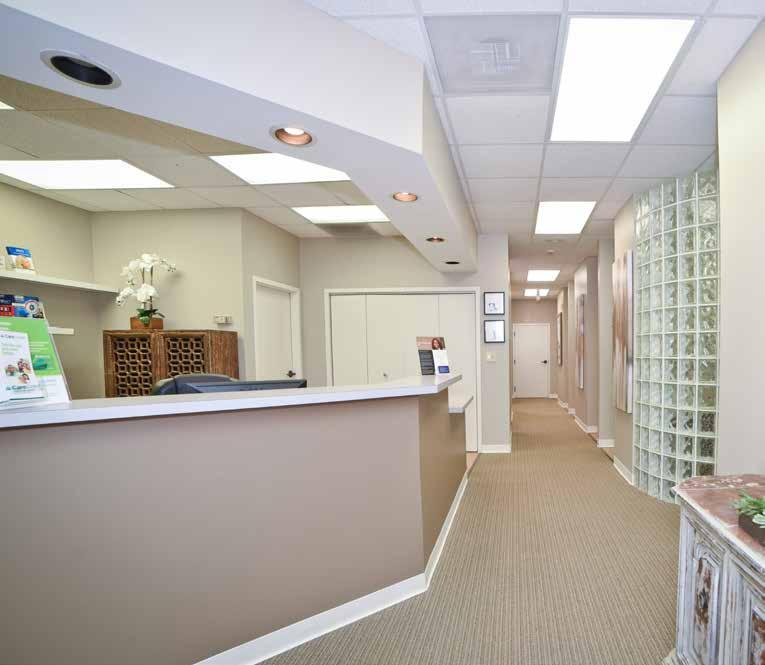 BY PETE MERCER
BY PETE MERCER
Tiffany Jamison-Rand is many things: a doctor, a wife, a mother of twins, an entrepreneur, business-owner, and practicing dentist. Perhaps most importantly, she’s an excellent multi-tasker. She’d have to be, just based on her extensive responsibilities in each of these roles.
MARCH/APRIL 2023 • DENTIST ENTREPRENEUR ORGANIZATION dentalgrouppractice.com 6 > Emerging Group Spotlight
In fact, during this interview for DEO Magazine, Dr. Jamison-Rand was literally in the process of cooking for her children, all while thoughtfully fielding questions about her company. Polish Dental Center is a multi-site dental organization that serves a wide swath of the metro-Atlanta area, with offices in Midtown
Atlanta, Alpharetta, Lilburn, and a new office in Marietta.
She’s grown this dental brand from the ground up, providing excellent dental care to thousands of patients in metro-Atlanta. Despite the constant challenges facing a women-owned business in the middle of a pandemic, Polish Dental has continued to grow in the last few years. Just last year, her company was named as one of the fast growing privately held businesses in the United States by The Inc. 5000.
The formation and growth of Polish Dental

Dr. Jamison-Rand started Polish Dental Center in Atlanta, Georgia in 2011. Before starting Polish Dental, she had gone through the process of purchasing several dying or “distressed” practices and renovating them enough to sell. By flipping these dental practices, she was able to build a system that would eventually result in Polish Dental.
Through the purchase of one of those distressed practices, she found that she could easily and inexpensively start to scale out her own dental brand. From there, she formed a new goal – to create something unique that didn’t exist while she was in dental school.
“There weren’t a lot of people – a lot of women or brown women that looked like me – that could mentor me in those big group DSOs,” she said. “I needed something that catered to me specifically, a female that wanted to do very well in dentistry, but still get the mentorship that I wanted and still have the resources of the DSO. Through
scaling Polish Dental Center, that’s what I was able to create.”
Developing a company culture
Polish Dental is woman-owned and woman-led. “My accountant is a woman, my lawyer is a woman, our regional manager is a woman,” Dr. Jamison-Rand said. “We provide that mentorship where you can balance the art of being a working mom and make the living that you want to make. We encourage each other to grow and develop into our roles to provide better care for our patients.”
Running a company that predominantly consists of women requires what many might consider to be a second glance at company culture. It didn’t make a lot of sense to take her team to something like a football game or sports bar for a company outing. Instead, as part of a team building excursion, Dr. Jamison-Rand took her group to see Oprah Winfrey when she was on tour in the pre-COVID days. After everyone was vaccinated against COVID-19, her team went to a local salon for manicures and pedicures.
In addition to building a healthy internal company culture, she’s also dedicated to serving her community. “Community outreach is really the hallmark of my business. As an Atlanta native, it’s really important for me to give back to my community. Because I care about this place. I’m from here, I live here, I die here. This is my home.”
Polish Dental formally partnered with the nsoro Education Foundation in 2021, an organization
DENTIST ENTREPRENEUR ORGANIZATION • MARCH/APRIL 2023 7 dentalgrouppractice.com
that sends kids who have aged out of the foster care system to college.
Her personal mantra is a fitting quote from President Theodore Roosevelt: “No one cares how much you know until they know how much you care.” She uses this ideology to shape her relationship with the local nonprofit, giving away free dental work to nsoro scholars.
In the first year alone, Polish Dental gave away about $145,000 of free dental work to these individuals. “One of the really cool things about that relationship is that we weren’t just giving away free dental work. We were giving a home doctor’s office to a group of young adults that didn’t previously have a dentist.”
She said, “Most of us grow up going to the same dentist our whole life, but these young adults do not. We were able to give them a home
that would continue to take great care of their dental needs.”
Growing Polish
With multiple offices, Dr. JamisonRand created a platform for excellent dental care and comprehensive office management, while maintaining that family feel received from her mentor. This platform includes a top-notch insurance team to ensure that Polish gets reimbursed properly, a call center to handle scheduling and patient calls, and outsourcing insurance verification.
The key to her success with Polish Dental is her ability to move with the economy. For instance, instead of just adding practices for the sake of adding practices, Dr. Jamison-Rand is much more interested in adding more doctors to the current facilities. She said, “Income levels are high. With inflation and all that
uncertainty ... We don’t know what’s happening. But we are always finding new and innovative ways to change and grow. You don’t have to grow another building, edifice or whatever.”
As far as Dr. Jamison-Rand is concerned, you can continue to grow your practice by adding doctors and the types of services you provide. Later this year, she hopes to add specialties to her practice – endodontics and oral surgery. This, in addition to opening the office seven days a week, will help to retain and attract new patients.
Thus far, Polish Dental has primarily grown through acquisitions, but Dr. Jamison-Rand opened her first de novo in Marietta. PreCOVID, Polish was set to grow two to three practices each year. While she is confident that they will get back to that point, she’s mostly focused on internal growth right now.
But it hasn’t been easy. Every bit of scaling is difficult, especially in a pandemic. She doesn’t even remember what life was like before COVID, especially the challenges. “I can’t remember anything before COVID anymore. This was so traumatizing and hard that I can’t even tell you. There is nothing else that I’ve done that was harder than staying open. I could have told you a bunch of stuff, but it would’ve paled in comparison to what we just went through.”
Even with the challenges Polish has faced over the last 12 years, Dr. Jamison-Rand is looking forward to the future. Her company will continue to grow, her patients will continue to receive excellent care, and she will continue to create a space for women in dentistry to succeed in the metro-Atlanta area.

MARCH/APRIL 2023 • DENTIST ENTREPRENEUR ORGANIZATION dentalgrouppractice.com 8 > Emerging Group Spotlight
Dr. Tiffany Jamison-Rand
New Technology Increases Patient Comfort and Satisfaction
A new Customer Success program offers the customized support you demand when adopting digital equipment.
BY ANGELA, SEVERANCE, CUSTOMER SUCCESS MANAGER, IVOCLAR

Why new technology is crucial to a growing your DSO
In order to adapt to the ever-changing world of dentistry, meet and exceed patient expectations, and stay ahead of the competition, DSOs should consider embracing new technology. In my experience, digital workflows offer many benefits for both dentists and their patients. It is becoming clear, more so than ever before, that DSOs who focus on patient experience and customer satisfaction are those that find success. Happier patients are more likely to move forward with treatment plans and return for follow up.
Intraoral scanners are the perfect segue into a digital workflow and differentiate your clinic from others through patient centricity. VivaScan, a revolutionary intraoral scanner from Ivoclar, can help practices grow by managing chairside time more effectively and providing top-quality restorations in a fraction of the time. VivaScan will help your DSO create a more exciting, comfortable, and cost-effective experience for your patients.
The most essential part and key to success when switching from analog to digital impressions is proper training and support. Ivoclar offers a Customer Success Program that is committed to turning your learning curve into a confidence curve. Training is just the beginning of the VivaScan adoption experience.
When was the last time you had a positive experience calling customer support?
It is all too common for a DSO to adopt new technology and be left to fend for themselves. It can be frustrating to call a 1-800 number only to sit on hold before being transferred
to another department. Ivoclar wanted to create the complete opposite experience.
They will pair you with a dedicated customer success manager so that you have a direct line of communication to ask questions and receive additional training as needed. This way each VivaScan user has a successful integration with their new intraoral scanner. Doing so not only creates a better user experience but also creates a better patient experience.
The best part of the support is that it comes at no added cost. You do not have to worry about spending additional money on training yourself and staff. You can work at your own pace to make sure you are comfortable with your new technology.
Leading the way together
Celebrating a century of innovation within the dental industry, Ivoclar has always been committed to helping each of their customers succeed. Their commitment to your DSO goes beyond products; they are dedicated to providing you with the best education, service, and support available, so you can focus on patient satisfaction. With a reputation spanning 100 years, you can ensure you will be in good hands with Ivoclar.
Angela Severance, RDA, CDD was a chairside dental assistant for over two decades. She has over 15 years of expertise in CAD/CAM dentistry as an Implementation Specialist and Success Manager. Angela proactively offers clinical customer training and support for hundreds of dental offices around North America.
DENTAL GROUP PRACTICE • March/April 2023 9 dentalgrouppractice.com
Sponsored Ivoclar
Entering the Danger: One Man’s Opinion on Gender Equality in Dentistry
BY DR. ERIC J. ROMAN, PARTNER, DEO
Whether you’re a dental student, practice owner, or executive, it shouldn’t take long for you to recognize the gender inequalities that are pervasive in our industry. Recognition of this truth is great. But addressing the issue that exists in the dental industry is essential if you want to run a successful dental business in our changing times.

MARCH/APRIL 2023 • DENTIST ENTREPRENEUR ORGANIZATION dentalgrouppractice.com 10 > Leadership
As a man, discussing issues related to gender inequality in the workplace can be not just uncomfortable – it is oftentimes downright scary.
I’ll confess: This is a topic that makes me uncomfortable. Despite the fact that my executive teams were more female than male, I still really struggled to feel confident in these conversations.
Why was I so uncomfortable? Let’s postulate some reasons. However, I’m not justifying my actions or emotions. I’m just sharing them, hoping to make this topic more approachable for everyone on your team.
Perhaps one of the first reasons that I sidestepped the topic was the prevalence of news articles and social media posts publicly vilifying men for saying the “wrong thing” regarding gender equality issues. I wanted the best for my people, but I certainly didn’t want to upset anyone or draw “undue” attention by saying something that would be perceived as inappropriate or inconsiderate.
You see, as a society we’ve created these standards for how we discuss gender issues in the workplace. There are even appropriate vocabulary terms. The trouble is, not all of us are aware of the appropriate terminology or discussion standards. It’s not like we have posters on our walls describing what to say and what not to say. Even if we did, based on my experience, those posters would change regularly.
Out of the fear I might say something wrong, I chose to say nothing at all. And saying nothing solved nothing.
Thankfully, I’m not a representation of all men on this topic. But, I
know I’m not alone in calling out my fear of engagement. And fear isn’t a valid excuse for not contributing towards improving gender equality. It’s definitely a challenge we can and must overcome.
Luckily, there are ways to overcome this fear and open up a healthy conversation surrounding gender equality in the dental service industry, which I’ll get to in this article. But first, let’s understand why gender equality in the dental industry is such an important issue to discuss.
shifted nearly as much: the executive leadership of our DSOs, and our conference and continuing education presenters. Look at the executives in the DSO you most recently studied. Look at the speaker roster for the upcoming conference. Are they men or women?
Though there has definitely been an increase in women’s leadership within the dental industry over the past 15 or so years, I’m still witnessing huge gender imbalances in a few areas. For the sake of my
Women are the majority of the dental field, except in executive leadership
Prior to the 1980s, almost all dental school graduates were men. But now, graduating dental school classes are 50% or more female – showing a huge change in the gender balance within this sector.
Despite this massive increase in the number of women choosing careers as dentists, the makeup of our auxiliary support teams has always been predominately female. Between our dental assistants, hygienists, administrative teams, and managers, most dental company’s teams end up being 70% to 90% women.
However, a few of our traditionally male-dominated roles haven’t
experience and desire for change, the remainder of this article will focus on addressing the prevalence of women at the executive level.
Let’s be clear: I want this to change. And if you’re a man in this industry, you should want it to change too. Here’s why.
The issue with gender imbalance at the executive level
If you didn’t already know, not having enough female representation at an executive level in your dental organization isn’t a good thing. It has several negative implications for your company, including the following:
DENTIST ENTREPRENEUR ORGANIZATION • MARCH/APRIL 2023 11 dentalgrouppractice.com
You see, as a society we’ve created these standards for how we discuss gender issues in the workplace. There are even appropriate vocabulary terms.
Decreases leadership effectiveness. It’s possible that when the gender balance of your dental executives doesn’t match that of your workforce, it can create an “us vs. them” mentality, where the women in your workplace don’t feel as though they’re treated fairly – decreasing performance and increasing turnover.
Makes attracting female talent difficult. When it comes to dentistry, the future is overwhelmingly female. At the same time, the struggle for talent is real. So if your executive leadership team doesn’t reflect the new gender balance, you might have trouble attracting top dental talent to your organization.
Women executives’ voices aren’t heard. I’ve hired executive women who talked about how their voice was less important at the leadership table. And if they were ever asked for their opinion? It didn’t matter as much as the men speaking at the table. If this is happening in your organization, you are missing out on massive upside.
Women executives aren’t paid as much. Assessing pay structures within the executive leadership level, we’ve seen discrepancies in how much men and women are paid. Not only is this just plain wrong, but this pay gap can also have disastrous effects, from a mass exodus of dental talent to legal action being taken against your company. If there is a legitimate gender-based pay gap, one way or another, you are going to pay up. And the process won’t be fun.
Women executives aren’t given credit. Did you know that women are less likely to be given credit for their achievements in executive dentistry positions? Male performance is often viewed more positively than a female’s. Don’t even get me started on men stealing credit from their women counterparts! The cost to your company is the decrease in contributions these exceptional leaders make in the future.
Women executives are judged differently. Some interesting research from Sheryl Sandberg shows that likability and success are positively correlated with men but negatively correlated with women! So the more successful women are, the less likable they’re perceived to be.
If you weren’t aware of the above issues with gender inequality, then it’s seriously time to educate yourself on what women go through in the workplace. We must recognize that these gender inequality issues stem from generations of conditioning and learned biases.
And it’s up to us to undo them if we want to become true allies to our women colleagues and tap into the enormous upside your company can experience. Here’s how to approach the topic of gender inequality in your own dental practice to improve leadership effectiveness.
How to promote gender equality in your dental organization
When promoting gender equality, we need to get comfortable with having uncomfortable conversations with
our male and female colleagues. Here are the steps you should take to approach these conversations.
Step No. 1: Assess the data
Acknowledge where you are by looking at your company’s data and asking yourself some hard questions.
> Are the women dental professionals in my company being paid the same as men in the same position?
> How many external women executives have I hired compared to those who worked their way up? (You’ll find most women had to work their way up in comparison to men!)
> Am I just as open to hiring an externally qualified executive leader who is a woman as I am a man?
> How many complaints have been lodged by women regarding gender inequality or harassment?
> Does the gender balance of my executive team reflect that of the broader dental organization?
Step No. 2: Uncover biases
You must consider the biases within you personally against women leaders and women in general, as well as the biases within team members at your company.
For example:
> Do you frown upon assertive women?
> Are you judging mothers differently to fathers?
> Are men listening properly to their women leaders?
> Do you assume men know more than women?
Important note! Men are not the only ones with biases toward women.
MARCH/APRIL 2023 • DENTIST ENTREPRENEUR ORGANIZATION dentalgrouppractice.com 12 > Leadership








Some people believe that women exact just as much or more gender discrimination against women than men do.
Step No. 3: Start the conversation
If you want to move your company more effectively into the future and hire quality talent, you need to train men to comfortably and effectively engage in these conversations with women.
I’m going to address the elephant in the room, which is the risk of opening up these conversations and ending up with a bigger, more obvious problem than before you started the conversation.
To avoid this, make sure you ask for constructive support and the space to make mistakes while you are still learning, and use the following strategy to approach the conversation about gender inequality in your organization.
Set goals. Set intentional goals for the changes you want to see within your dental organization as a result of having discussions about gender inequality.
Avoid penalties. Instead of punishing members of your team for their shortcomings regarding gender bias or inequality, make them aware of all the prejudices that could affect them.
Be open. Let your colleagues know what the gender-related issues in your workplace currently are and how you wish to tackle them with open, honest communication. And be willing to ask them what they see.
Disarm yourself. One of the best tools for having difficult conversations is the concept of disarming, whereby first pointing out what worries you about bringing up a particular subject.
Step No. 4: Ask for feedback
The only way to get a true lay of the land when it comes to gender inequality in the workplace is to ask those in your dental organization for their thoughts, feedback, and opinions.
You could send out an anonymous survey, host group discussions, and even interview team members 1:1 to understand their feelings on gender equality and how the balance of gender at the executive level impacts them.
Test out the following script: “Hello _____! As you know, I only want the best for our company and our people. I’ve been reading more and more about gender discrepancies in leadership and how much of a negative impact it could have on our future. And I have to admit that I probably have biases in my perspective. What do you think I might be missing or overlooking regarding our women in leadership roles?”
Step No. 5: Implement changes
It’s only possible to have these tough conversations in your dental organization if you’re going to take action. Make sure you actively implement feedback from your team members and create strategies to address gender inequality in your workplace.
And finally … please be gentle
Men, I know this might not be easy. Women, please show us grace and offer up support as we step into this truth. As healthcare professionals, we’ve always wanted what’s best for our patients and our people. Sometimes the only way to get there is through some tough conversations. I hope I’ve convinced you that it’s worth it and given you the confidence to enter the danger. As we engage a more appropriate representation of women in our executive teams, our entire industry and the world at large will be the beneficiaries.
I’m your heart-centered dental coach, inspiring change and manifesting impact to help you create a better future for your dental practice and the dental industry at large. Ready for stronger teams, happier patients, and surging growth? Let’s talk.

MARCH/APRIL 2023 • DENTIST ENTREPRENEUR ORGANIZATION dentalgrouppractice.com 14 > Leadership
Dr. Eric J Roman
Glidewell Presents the 2023 Guiding Leaders Program for Women in Dentistry

Guiding Leaders begins this May with a new group of women dentists at the helm.
BY BOBBIE NORTON, DIRECTOR OF STRATEGIC PARTNER RELATIONS, GLIDEWELL

With unprecedented demand, the Guiding Leaders program is back for its third year. Applications for the 2023 program opened early last December to accommodate the increased public interest from women dentists all over the country. The program sponsors have diligently combed through countless applications in order to select a small group of women dentists who have the drive to serve as leaders in the industry and beyond.
development, negotiating, financial planning, public speaking, case presentation and photography, and media and brand enhancement.
Guiding Leaders participants will also be able to earn up to 70 continuing education credits when they attend all of the sessions. “This program is so much more than a continuing education opportunity,” explained 2022 Guiding Leaders graduate Dr. Lauren Wilson. “It is a carefully curated leadership cohort of highly motivated professionals who share successes, challenges, and support to learn and grow together.”
“While it is always challenging to select only a handful of applicants to be a part of this dynamic environment, it’s encouraging to see so many talented women who are ready to take the next step in their careers,” said Stephenie Goddard, chief executive officer at Glidewell and Guiding Leaders visionary.
For the fortunate women who are selected, the 2023 program offers monthly, in-person courses at Glidewell’s Newport Beach campus from May to October. Each month, the Guiding Leaders will receive in-depth training from professionals in the field, personal coaches and mentors. These sessions and personalized lesson plans target some of the most topical, nonclinical subjects in dentistry, including practice management, leadership
The program is also known for its efforts to build strong bonds and a sense of camaraderie among its participants. Guiding Leaders receive invitations for private dinners at Mr. and Mrs. Glidewell’s home, celebrations on the Glidewell yacht in Newport Harbor, and various get-togethers throughout Southern California. “Leadership journeys are rarely taken alone, which is why the program aims to build a valuable support network, both professional and personal, for the women involved,” said Guiding Leaders sponsor Leila Fejzagic.
When participants graduate from the program in October, their leadership journey doesn’t stop there. Guiding Leaders is often seen as a springboard for women dentists looking to expand their horizons. “The Guiding Leaders program accelerated my growth and shaped me into a stronger, more confident leader within my family, practice and the dental community,” said 2022 Guiding Leaders graduate Dr. Preeya Genz.
To learn more about Guiding Leaders, visit guidingleaders.com.
Bobbie Norton started her career in dentistry as an RDA 25 years ago and uses her experience in dental surgery, orthodontics and prosthodontics to facilitate valuable relationships with industry partners at Glidewell. Her role as director of strategic partner relations is built on more than a decade of service at the company, with previous experience as the managing editor of Chairside® magazine and the project manager for clinical affairs.
DENTAL GROUP PRACTICE • March/April 2023 15 dentalgrouppractice.com
Sponsored Glidewell
Silent Obstacles
What challenges are keeping more women from leading, and how to overcome them.
 BY JOSEY SEWELL, PARTNER, DEO
BY JOSEY SEWELL, PARTNER, DEO
It’s 2023 and I can’t believe we are still talking about the importance of women in leadership positions. There’s enough science and research to prove that when women lead, companies are healthier, happier and more profitable. If you are reading this article, chances are you probably feel like women deserve a place at the table too. Why then, do we continue to struggle?
The dental team is made up of primarily women, and we are seeing more women graduate than ever before from dental school, yet executive teams and boards of dental groups and DSOs are primarily male. Why? Who is to blame? Is it the men? The men get blamed a lot. Is it other women? Most of us have been hurt and demoralized far more by other women than we ever have been from men. I have felt more psychologically safe in a room full of men than I have a room full of women.
Gender equality is a complex problem that needs a complex solution. Both men and women as gender groups need to find ways to promote and support gender equality and inclusion, but we are missing the silent obstacles keeping women from truly succeeding in leadership – how women think of and view themselves. It’s well known that men will apply for positions that they may not be fully qualified for, while women who are overqualified will live in doubt and not take a chance
at applying. I want to talk about the challenges I see women face in becoming leaders and some steps to overcome them.
Imposter syndrome
Imposter syndrome is defined as the persistent inability to believe that one’s success is deserved or has been legitimately achieved as a result of one’s own efforts or skills. I struggle with this one personally. I cycle through feeling like I can conquer the world to being scared someone will find out I shouldn’t be in the position I am, and I shouldn’t be writing, speaking or coaching high-level entrepreneurs. I continually struggle to accept my success and feel like I deserve my place in this industry.
MARCH/APRIL 2023 • DENTIST ENTREPRENEUR ORGANIZATION dentalgrouppractice.com 16 > Leadership
I do lots of things to combat these feelings of inadequacy. I keep a journal. I write about my experiences with clients, my team and other industry experts. I keep text messages, social media posts/comments (the positive ones), testimonials, and cards, and on the days I feel like a fraud, I read my own reflections about my work and the words of others to remember the truth. I have to keep facts in front of me of my success so I can stop the negative thoughts. I have a couple of people I’m very close to that I can call when I’m having a difficult time. I’m open with them about my feelings, and they help challenge my thinking and remind me of the good I’ve done.
I have also noticed that these feelings come when I am fatigued or out of my health patterns. A healthy mind follows a healthy body, and if I’m not exercising, eating well, sleeping well or keeping to my spiritual patterns, my mind starts to fill with doubt. It’s normal to have these feelings occasionally. Humility is a beautiful thing, but we need to keep it in check and realize that our greatest obstacles to our own success may be our thinking.
Fear of failure
I hear it all the time: “I really want to lead, but I don’t know what to do. I’m afraid I will fail.” Guess what? Nobody knows exactly what to do. Failing is part of the journey and something to be embraced, not avoided.
Think about the first time you did anything: taking care of a patient, giving a presentation, riding a bicycle, etc. Were you an expert the first time? Heck no! You won’t be a perfect leader. Being a successful leader is a lifelong pursuit, and even when we have lots of practice and are pretty successful, we still have moments when we fall down and have to get back up again. You will learn far more from your failures than you ever will successes.
Take a moment and reflect on your life. Think about a time when you failed. Did you
survive? Were you better for it? Did you do things differently after you failed? Let go of perfectionism and enjoy the journey of becoming. Nothing turns out exactly like we want it to, ever. Your failures may end up being what propels you to become who you were meant to be. Stop shaming yourself and stop living beneath your potential to avoid the natural, necessary processes of growth.
Waiting for permission
I know a lot of incredible women who want to lead but are waiting for someone to tell them it’s time or open the door for them to walk through. Nobody is going to give you permission. Nobody is going to hold your hand and tell you what to do and when to do it.
In general, men are better at taking risks and putting themselves out there, while women wait for someone to convince them to lead. If you have the calling in your heart to lead, this is your sign to open your mouth and do something. Take some time to consider if you really want to lead and why. Connecting with your personal ‘why’ will motivate you to overcome any fear of rejection you might receive when you make it clear you want to lead. You will not know what to do before you act. With action comes clarity. Don’t worry so much about the steps, just get started where you are with what you have. Remember, rejection is just redirection –eventually you will find where you fit, where you are valued and how you can provide the greatest impact.
My journey from clinician to executive to entrepreneur has not been easy, but the best view comes after the hardest climb. From where I sit, the future is bright. If we’re going to thrive as an industry, we need more capable women in leadership, and more men in positions within the dental office team (dental assistants, hygienists, front office, etc.). When we embrace gender diversity in the workplace, everyone wins.
Josey Sewell is a dentistry expert in applying an operating system in dental groups to help them clarify their vision, focus on what matters, and achieve improved team health. She has unique expertise and the ability to weave together sound business systems and team development strategies. Her development programs have empowered leaders and executives to find more joy in their work and control of their business.

DENTIST ENTREPRENEUR ORGANIZATION • MARCH/APRIL 2023 17 dentalgrouppractice.com
Leading a High-Performing DSO
Making the Right Technology Investment for Your Team and Your Patients. BY
PLANET DDS
As a dental service organization (DSO), your success hinges on your ability to efficiently manage your practices as well as ensure high-quality care for your patients. To be able to achieve both while scaling your organization, you need the right infrastructure in place. In this article, we’ll cover the benefits of using a cloud-based practice management solution and the keys to lead a smooth transition to the cloud.
Benefits of Cloud-Based Practice Management Solutions
1 Cost Savings: The cost for server-based systems quickly add up, especially as your DSO grows in size and complexity, exceeding the cost of cloud-based solutions. With added reliance on servers, IT staff, increased need for more hardware and software, and extra service and support, there are many costs that need to be considered when comparing with a cloud-based solution. Calculate your current costs in this interactive calculator.
2 Accessibility: With cloud-based solutions, you and your team can access patient records, X-rays, and other practice data from virtually anywhere with internet connection. This allows for faster collaboration and flexible work arrangements.
3 Security: Cloud-based solutions offer enhanced security to protect patient and practice data against theft, damage, loss, and natural disasters through automated backups, firewalls, audit trails, and userbased controls.
4 Scalability: Cloud-based solutions are designed to scale as your organization grows and evolves.
Keys for a Smooth Transition to a CloudBased Practice Management Solution
To lead a smooth transition to a cloud-based practice management solution, consider the following:
1 Vendor: Choosing the right vendor can make or break your experience so schedule product demos and ask a lot of questions. Find out how much experience they have with other DSOs like yours, ask for references, and find out about their experience implementing the solution.
2 Change Management: As with any new software implementation, there will be a period of adjustment. Finding the right technology partner will help make
the transition a smooth one so you and your team can begin reaping the full benefits of the new solution.
3 Training: Ensure that staff members are properly trained on how to use the solution to increase productivity and return on your investment.
4 Communicate: Work closely with your vendor and your team to ensure your implementation process gets rolled out on time.
By working with the right technology partner, your DSO can scale and grow while providing a better experience for staff and patients.
Scan the QR code to learn about our client’s experience moving to Planet DDS solutions.

MARCH/APRIL 2023 • DENTIST ENTREPRENEUR ORGANIZATION dentalgrouppractice.com 18 Sponsored Planet DDS
Dental Software Subscription Calculator Practice Management Software Vendor Support and Services Package Cost for Additional Providers and Users Patient Communications Software Online Patient Registration and Forms Online Patient Portal Dental Imaging Software Practice Data Aggregation and Reporting Software Integrated Clearinghouse with Claims and Attachments Practice Management Software Vendor Support and Services Package Cost for Additional Providers and Users Calculate your practice’s monthly costs associated with practice management and compare to all-in-one Denticon Practice Management Software bundle pricing. Current Practice Management Additional Third-Party Software On-Premise Hosting, Data Backup, & Security Total Current Cost of Monthly Subscriptions TOTAL COST PER MONTH: TOTAL COST PER MONTH: TOTAL COST PER MONTH: ENTER DOLLAR AMOUNT ENTER DOLLAR AMOUNT ENTER DOLLAR AMOUNT would challenge anyone to take a pen and paper and add up all of the costs of buying and maintaining hardware. It’s just not affordable. And then there are security issues, maintenance, backups, IT consultants that you also have to pay for. JONATHAN PENCHAS Midtown Dentistry Compare Your Current Monthly Costs to the All-in-One Denticon Practice Management Bundle and Discover How Much You Could Save GET A PRICE QUOTE $ 0.00 $ 0.00 $ 0.00 $ 0.00 $ 0.00 $ 0.00 $ 0.00 $ 0.00 $ 0.00 $ 0.00 $ 0.00 $ 0.00 $ 0.00 $ 0.00 $ 0.00 $ 0.00


Tried and Tested
One dental group practice tested three different hygiene models to see which one would be the most successful –for team members and the organization.
 BY DR. KATHRYN ALDERMAN, CEO AND FOUNDER, NEBRASKA FAMILY DENTISTRY
BY DR. KATHRYN ALDERMAN, CEO AND FOUNDER, NEBRASKA FAMILY DENTISTRY
The only constant in life is change. Amongst all the changes that dental practices have recently faced in the U.S., one of the most debilitating was the sudden shortage of hygienists. Dental hygienists often feel both undervalued and underpaid. Because of this, hygienists have become hard to find. Not only that, but they are also in such demand that the cost of paying them has hit a sharp increase.
Like many dental practices in the country, my group was affected by this trend. We needed more hygiene appointments to minimize the loss in revenue and ensure high patient retention, even amid the chaos of the last few years. We had to step back and look at our current business model to avoid losing patients due to limited hygiene availability.
In our group, we tried and tested three different business models:
1. Doctors doing hygiene.
2. Associates with the help of DAs doing hygiene.
3. Hygienist-centered business models.
We found the first two options are preferred by startup practices, while a hygiene-centered business model is the most successful for established practices. Ultimately, the established offices which utilize dental hygienists had higher scores in all the most important areas:
1. Higher retention rates
2. Higher net referring score
3. Higher case acceptance
4. Higher collections per patient
5. Higher net revenue
This opportunity provided them with an increased feeling of value and career advancement, and helped expand their value to our clinic and what they could contribute to our services. Patients are able to receive more comprehensive and carefully-tailored dental care at a much higher standard when being treated by our advanced dental hygienists. Moreover, our hygienists helped us tremendously with achieving highcase acceptance rates for periodontal treatment and operative, cosmetic, and auxiliary dental services.
Key areas
One of the things that we did was increase the pay rate for all hygienists to remain competitive in the current market. Beyond this, we also offered professional advancement opportunities to our hygienists. They could enter our mentorship program, which provided additional training and empowered them to become advanced hygienists. Valuing dental hygienists and giving them career growth opportunities, such as our mentorship program, is very appealing and helps them to feel properly utilized and valued. Through their advanced training, our hygienists were able to blossom even further into becoming industry leaders in oral health, periodontal therapists, and patient advocates.
Our mentorship strategy of our hygienists trained them in several key areas, including (but not limited to):
Business strategies. Hygienists care about the well-being of their patients and do not just want to be salespeople – they want to advocate for their patient’s health and help them make the right decision. This desire can still be utilized in a way that helps a practice achieve its business goals. Specifically, we trained our hygienists to understand their role in creating a positive patient experience, to understand KPIs and health stats for their department, to grasp schedule building better, and to understand the cycle of business success and their part in it.
Periodontal therapy. Advanced hygienists with a knack for periodontal
MARCH/APRIL 2023 • DENTIST ENTREPRENEUR ORGANIZATION dentalgrouppractice.com 20 > Mentoring
therapy can master the clinical standards for managing the disease, including diagnosis, treatment, putting the disease in remission, and helping patients to manage their risks for the disease.
Communication and case acceptance. Hygienists are at an advantage in their role of increasing case acceptance due to their love for helping patients achieve better health. In fact, the best way to increase case acceptance is to educate, engage, and inspire patients to say “yes” to their needed treatments. This training session helped them to strengthen even further in this area.
Operative dentistry. Our advanced hygienist training covered operative dentistry, including protecting first molar occlusion: scanning fragile molars, and protecting with FCC. It also covered decay identification and more patient education strategies.
Tooth replacement. Our hygienists felt better equipped on how to help patients whose best option might be to seek tooth replacement with either a full-mouth reconstruction or hybrids.
Cosmetic dentistry. Not only were our hygienists trained in this module to better handle the benefits and limitations of teeth whitening, but they also were trained in facial esthetics, including Botox, clear braces, and more. They feel better equipped to present options to patients and share success stories confidently.
Hands-on clinical training. Some of our hygienists were interested in investing in additional skills in their areas of interest or in the area their dentist focuses on, ranging from TMJ treatment to sedation dentistry, sleep apnea, and laser therapy.
To ensure that our advanced hygienist program was effective, we followed our results with KPIs
to monitor the mentorship program’s effectiveness. The results speak for themselves. Our offices experienced the following:
1. Increased our case acceptance rate for all routine operative work to 90%
2. Increased the case acceptance rate for SRP to 90% and above.
3. Retention of hygiene patients increased to 90% and above.
4. Ensured that we collected over $150-200 per hour on the hygienist end of our clinics, with a mix of PM, recalls, NPs, SRPs, X-rays, and auxiliary services.
5. Increased the effectiveness of our periodontal therapy services.
6. Helped our hygienists feel more effective and fulfilled as patient advocates and educators.
7. Increased our overall clinical case acceptance rate.
Remaining profitable and effective
Change is the only constant in the dental industry. Our growing dental group is no exception. At all our practices, whether it was the well-established, younger or brand-new locations, we had to test three different hygiene models to find the best model for us. We did see a significant benefit in adapting to the advanced hygiene-centered model. As a result, our practices saw higher retention rates, net referring scores, case acceptance rates, collections per patient, and net revenue after we refocused on supporting our dental hygienists.
To ensure that this model can remain profitable and effective, offering mentorship and career opportunities for professional development to dental hygienists is extremely crucial. Just as crucial is the measurement of the effectiveness of this model through the use of KPIs – but I fully believe the results will continue to speak for themselves.
is CEO and founder of Progressive Practice Solutions and Nebraska Family Dentistry multilocation group. Dr. Alderman has extensive experience in marketing, leadership, and business development. Her goal is to support dental practices by mentoring in areas of leadership, marketing, and business strategies to grow successful and profitable businesses fast without burnout. You can connect with Dr. Kathryn Alderman at: www.linkedin.com/in/ progressivepractice solutions; https://progressive dentalmentor.com; email: progressivedental mentor@gmail.com

DENTIST ENTREPRENEUR ORGANIZATION • MARCH/APRIL 2023 21 dentalgrouppractice.com
Dr. Kathryn Alderman
Case Acceptance and Practice Growth: How to Get More ‘Yes’ and Increase Revenue
Did you know that only 34% of recommended dental treatment is actually performed on patients? Let’s talk about why acceptance rates are so low and what you can do about it.
BY ACCEPTCARE
The relationship between case presentation and case acceptance has always been tenuous, especially when it comes to new patients where the acceptance rate can be as low as 25%.
Your patient is in your chair, you performed the exam and presented the treatment. Shouldn’t getting your patient to say “yes” to treatment be the easy part? While there can be many reasons for the hesitancy to say “yes”, there are some obvious reasons to point out. The good news is, they’re the same ones we can help overcome.
Why are case acceptance rates so low?
Many practices will provide the treatment presentation in one room (e.g. exam room) but have the patient move to another room/person for the payment presentation. Additionally, both aspects of the treatment presentation spectrum are often done on different platforms. The lack of synergy between treatment presentation and payment option presentation is what causes patients to hesitate and deliberate on case acceptance.
In addition to the disjointed treatment presentation process, there’s of course the “how am I going to pay for this” part. Here are the main reasons people say no to treatment when it comes to payment options:
> Limited payment options for patients.
> Lack of patient choice for payment terms/interest rates.
> Limited financing approvals that do not cover complete care costs.
> Credit score not optimum.
If you’re offering a healthcare credit card or in-house financing only, there’s a better way to “get the yes” from your patients.
More than financing. It’s a case acceptance engine that puts the power of choice in the patients’ hands, boosting acceptance rates and revenue.
The power of patient choice
AcceptCare alleviates the 3 main pain points when it comes to increasing case acceptance:
1. Present your treatment plan and payment options together.
2. Patients can pick from multiple payment or financing options, and choose the terms that work for them.
3. Automated text and email allows patients to review and choose a plan even after leaving the practice.
Your practice can:
> Easily present treatment and payment options in one place.

> Accurately track and measure case acceptance rates.
> Increase same-day starts.
Your patients can:
> Pick the plan and options that work best for them.
> Apply for loans from multiple lenders from one platform.
> Sign and approve your treatment and payment plan on one platform.
It’s simple, seamless and powerful. It’s the only all-inone treatment and fee presentation solution in dentistry and it will change the way your present treatment.
Give your patients an easier and more flexible treatment acceptance experience and grow your practice today.
Scan the QR code to learn more or get started with AcceptCare today.
Mention DEO to get your first 3 months free.*

MARCH/APRIL 2023 • DENTIST ENTREPRENEUR ORGANIZATION dentalgrouppractice.com 22 Sponsored AcceptCare

When Hygienists Have Ownership
Peak Dental Services believes its path to ownership for dental hygienists will benefit team members, the organization and patients.
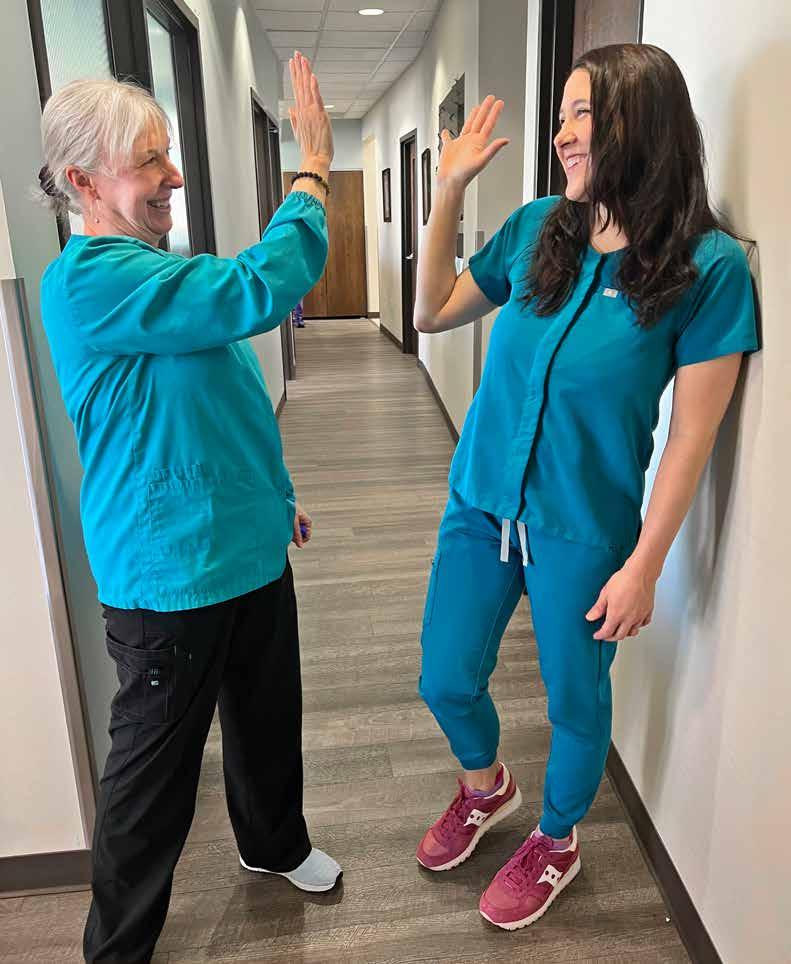 By Graham Garrison
By Graham Garrison
A patient often spends more time with the hygienist than anyone else in a dental group practice. Thus the hygienist, perhaps more than any other member of the practice, has the greatest opportunity to solidify the relationship, experience and, ultimately, loyalty to the practice, said A.J. Peak, CEO of Peak Dental Services.
MARCH/APRIL 2023 • DENTIST ENTREPRENEUR ORGANIZATION 24 dentalgrouppractice.com
Those aren’t just sentiments. Recently, Peak Dental Services, a leading dental services organization with over 50 locations throughout Colorado and Texas, announced a new ownership package for all the organizations’ hygienists. The intent of the ownership package is to honor the importance of their hygiene team, and expand their financial goals within the company.
For the first time, Peak Dental Services will be providing hygienists with ownership opportunities similar to Peak Dental Services’ dentists.
“When the time came to make the choices for the ownership package, Peak Dental Services made a bold move and offered ownership in Peak itself, not just in the doctor or hygienist’s dental practice,” said A.J. Peak at the time of the announcement. “It is disingenuous to limit the ownership package to the dental practice because our providers’ prosperity would be limited to those 4 walls. Now, all our doctors and hygienists can grow their wealth with us as an owner of the whole company.”
Solidifying the patient relationship
There are many ways that hygienists play a key role in the dental group practice. Peak cited three in particular. First, patients generally spend more time with the hygienists than anybody else in the practice, so it solidifies the relationship, experience and, ultimately, loyalty to the practice.
Second, and consistent with number one, patients look to the hygienist to discern the recommendations of the dentist. “Almost
more than anybody else, the hygienist helps in most of the conversations where patients accept treatment because of the trust built,” he said. They often look to the hygienist as a third-party guide to what the dentist recommends.

Third, if you don’t have capacity, then you’re not able to fulfill consumer demand. To fulfill that demand, you need hygienists for obvious reasons.
Equity in the organization
Because Peak Dental Services is so passionate that the customer experience begins with and is often carried out by the hygienists, leadership wanted to offer the equity program to them on the same terms as the dentist owners. “Ultimately, we wanted to back up our words on hygienists being a critical, if not one of the most important, individuals delivering a
distinctive patient experience,” Peak said. “You need hygienists to deliver that. They often spend the most time with our patients.”
Patient experience is the organization’s number one core value. And as a part of that, in a really tough economy, “Why wouldn’t we,” is what leadership asked themselves. “If hygienists really are the key ingredient to the patient experience, at the board level we asked: ‘Why wouldn’t we?’ Nobody had an objection, it was just meditating on how quickly we could do it.”
There were lots of discussions on how the ownership package would be designed. Leadership asked themselves why would they design it differently for hygienists versus the dentists? “We really believe that they’re a critical stakeholder in the company and our success, so why would we make it different?”
DENTIST ENTREPRENEUR ORGANIZATION • MARCH/APRIL 2023 25 dentalgrouppractice.com
A.J. Peak
There’s a minimum investment threshold, and a quality investment threshold criteria that hygienists must meet. “We’re not letting poor performers in the sense of quality be allowed to be a stakeholder in the company,” Peak said. Essentially there’s different criteria that they’ve got to fulfill to have a stake in the DSO. But once they do, they’re an equity holder.
About 10% of Peak’s hygienists signed up for the program in its first offering, which coincidentally was the organization’s initial goal. The ownership package was brand new and to Peak’s knowledge, has not been offered in the industry before. “We didn’t make it any easier or harder than it is for the dentists,” Peak said. “In some ways, I think that gave it credibility, but it also took some courage for them to invest just like the dentists. We held them to the same standards on that end, and so we’re pretty excited about that.”
Peak Dental Services will only open the window to enroll once a year. They are reopening the window around March-April of this year, and have had many more hygienists since the first window inquire about the package. “It will be interesting to see what happens, given the early adopters.”
The organization is already seeing benefits from the hygienists’ investment in the company. Hygienists that joined are part of the monthly owner updates. They’re often the very first that get involved with decisions.

Annually for owners there is a retreat. This past year, Peak’s ownership team went to Vail, Colorado for the weekend. Their owner hygienists
Peak Performance
Peak Dental Services has built and aligned their hygienist team on curriculum that’s backed by research. All of Peak’s hygienists go through what they call HE120 Hygiene Excellence. It’s a six-hour seminar with 120 days of follow-up homework just to make sure they’re aligned with the latest clinical research based upon risk factors and agents.
“The fact that we ask all hygienists to go on that 120-day journey is unique,” Peak said. “And there’s things that we may not elect to offer patients because we don’t see double-blind research to back the efficacy of those solutions, and sometimes it’s stuff that our peers are doing pretty heavily and we don’t because we don’t see the efficacy behind it in the research. All the hygienists that join us have by region a hygiene mentor that spends time with them to help them through the systems and how it works.”
MARCH/APRIL 2023 • DENTIST ENTREPRENEUR ORGANIZATION 26 >
dentalgrouppractice.com
When Hygienists Have Ownership
POWERFUL. PRECISE. BALANCED.
NSK’s Award-winning Handpieces & Micromotor System were designed to inspire the work of the clinician, prioritizing contamination reduction.

9.5mm Shorter

3.7g Lighter nano95LS
DualDefense
All couplers and micromotors have integrated ANTI-RETRACTION SYSTEMS that reduce cross-contamination of water lines.
All NSK handpieces are equipped with a CLEAN HEAD SYSTEM that reduces suck-back.








Smaller, lighter, and perfectly balanced.
NSK’s nano series electric attachments have all the benefits of our premium Z Series, but with a slimmer design to fit comfortably in your hand!
NSK America Corp www.nskdental com 1800 Global Parkway, Hoffman Estates, IL. 60192 • Tel: +1 (888) 675-1675 • Fax: +1 (800) 838-9328
were in the front row seats contributing to the discussion in where they are going as a company, what things they need to work on, what new technology or new systems they may want to get involved with, etc. “They have an active voice that really doesn’t differ from the owner dentists,” Peak said.
In regards to the owner dentists, Peak estimates that 90% immediately were on board from the start with the package, and 10% took some time to think about it. “That 10% just wanted to think through what it would mean,” he said. Ultimately, it was a unanimous decision of the owner dentists.
“As a board, we were wildly supportive. Our financial sponsor, Varsity Healthcare Partners, which only invests in healthcare, provider-based businesses, is wildly supportive of it.
Rave Reviews
We would’ve rolled it out even sooner, but we wanted to give the doctors time to digest it and make sure they supported it.”
Peak believes the doctors, hygienists, board and financial sponsor have all been pleasantly surprised by the results. “There were a lot of What Ifs,” he said. “But I think everybody is incredibly mature, professional, and did exactly what we wanted it to do. We wanted to share in the upside and the ownership mindset and a contribution to key decisions on that front. We’re really looking forward to opening the window this year, and hopefully it continues to expand.”
The ownership package has benefited the organization’s culture because of the credibility it reinforces. “If we say that hygienists
Several Peak Dental Services hygienists who signed on to the ownership package provided their take on why they found the opportunity valuable:
> “Given the opportunity to become a hygienist owner with Peak Dental Services has given me a vested interest in the company’s performance; which has increased my drive and enthusiasm to perform.” – Celeste
Ebell
> “I am so grateful to work for a company that truly values its hygienists! I invested because this is a tremendous and rare opportunity to grow my personal wealth and invest in a company I believe in.” – Emi Green
> “So excited to be a part of this empowering and innovative Hygiene Owner Program with Peak Dental Services. Congratulations to ALL Hygiene Owners and Peak Dental Services for their Leadership!”
– Nancy Rogers, RDH, BSE
are critically important, then I don’t know how more I can back it up than to say you can be side by side with me as a founder in enjoying the upside, and we can all work together to create a good outcome and build a strong company together,” Peak said. “So it’s the credibility that we’re in this together and we’re going to share in it.”
These are unprecedented times post-COVID. Peak Dental Services is not forcing the ownership package on people. It’s a personal decision. “For some it’s a family decision if they want to, but we wanted them to know that it’s there if they want it.”
Indeed, post-pandemic the bar is now higher for every business across all economic sectors. Peak Dental Services has tried to either meet or exceed those expectations, whether it’s financial, making sure people feel like they’ve been heard or that they’re responsive to feedback. “We are where we are,” Peak said. “If the bar increases, then we’ve got to meet those demands. Sometimes it might be an economic demand, sometimes it might be scheduling flexibility, sometimes it might need to be more increased responsiveness or involvement in the decision-making on a piece.
“The thing I’m most proud of is the equity program,” Peak continued. “Nobody is perfect, but being willing to do that and our financial sponsor being wildly behind it, and the dentists being behind it, that, for me, was a big landmark. It was a credible act to say, ‘Hey, this is what you mean to us, and this is how we are in this together.’”
MARCH/APRIL 2023 • DENTIST ENTREPRENEUR ORGANIZATION 28
dentalgrouppractice.com
> When Hygienists Have Ownership
Dykema’s 10th Annual Definitive Conference for DSOs brings together the industry’s most influential leaders to share their insights on DSO dentistry.
Access objective presentations to help achieve the goals of your business









Network with leaders in the industry
Integrate best practices to drive network value











Experience first-class entertainment

dykemadso.com/2023-info Join us! July 19 – 21 Gaylord Rockies Resort and Convention Center © 2023 Dykema Gossett PLLC. All rights reserved. For questions or help with registration: DykemaDSO@Dykema.com
Fresh Thinking Register Now DSO Conference th ANNUAL
Begins Here
Women Leaders in Group Dentistry
The hopes, dreams, challenges and experiences of successful female DSO leaders.
Numbers matter. At a dental group practice, how could they not? But for Jenny Britt, they don’t fully measure the success of an organization. Women leaders perhaps understand this innately, she said. Women have compassion, empathy, and grace. “We’re not just about hitting a number,” she said in a recent DEO Women Leaders panel discussion. “What led us to that number? What are all the great things that we did? How many people did we take great care of? Do we take great care of each other? Because that truly shows within the numbers. That is definitely one of the unique abilities of women in leadership, in business and in dentistry.”
DEO Partner Josey Sewell recently hosted a wide-ranging discussion with several women leaders in group dentistry, including Britt, who

shared the strengths that women bring to their organizations, obstacles they’ve overcome, how to prioritize one’s time with work and family, and what they would tell their younger selves. The following are portions of the panel discussion.
Josey Sewell: What leadership strengths do you believe are perhaps more innate to women than men?
Amy Lee: I think one thing that we are good at is socializing … We’re always trying to find a way to socialize, connect, and help each other, whether it’s tutoring a child, getting them to dance practice, etc. I was just at my daughter’s dance practice, and a parent was recording another person’s child and sending it to them because they couldn’t be there.
Whitney Weiner: To me, a big part of it is the compassion that we bring to the leadership role. There’s so much empathy and compassion in our innate maternal instinct that translates – from leading a family unit to leading a company. Also, the humility and vulnerability of wanting to seek out our blind spots and hire around them. You know, we joke a lot that ego is not your amigo, and I think a lot of female leaders own that. When you show up with a sense of humility and your team feels that it’s okay to fail, it can unlock their potential and help them not be afraid to push the limits and try new things. In our company, we celebrate failure because we fail forward and we’re able to discuss failure openly without it being a negative commentary on someone’s character.
MARCH/APRIL 2023 • DENTIST ENTREPRENEUR ORGANIZATION dentalgrouppractice.com 30 > Leadership
Jill Jenkins: Whitney, I agree with that so much. What people deem soft skills are vitally important to operationalize. I’ll put a plug in for the DEO. The head, heart and hand tools that we utilize allow me to operationalize soft skills, to quantify something that seems traditionally unquantifiable. It opens up those conversations, it allows me to be vulnerable as an owner, and it encourages employees to be vulnerable and have those conversations. So I do believe that’s more unique to a feminine way of leadership than masculine leadership.
Whitney Weiner: Jill, I think you nailed it. The DEO Map, Fit Finder and the 5 Ps all make things less subjective, so now we have analytics to keep score in a way that doesn’t feel so harsh. I don’t know about you, but for me, sometimes numbers just feel so rigid without room for the value of culture and positive energy. So to be able to take all these tools and use them to build out our company’s operating system has been amazing. It has allowed us to marry our soft skills of empathy and warmth of being a mom – while also being a boss and holding people accountable –and have a scorecard for that.
Josey Sewell: Has anybody else struggled with letting their big heart keep them from being profitable in their business?
Whitney Weiner: We’re building awesome things leading with the heart and the head. It’s important to marry the two, I’ve found.
Jill Jenkins: I do think it is a little bit more of a unique challenge for
female owners, or female business leaders in general, to want to have that sustainability of emotional intelligence and flexibility in the understanding of their female employees, and then balance that with compassion, empathy and profit. A lot of times for me – and I think the people on this panel probably would agree – as we start with culture and we start with people, profit is an outcome of those things rather than looking at profit as the driver for everything.
Amber Nish: I agree and will add an experience I had when I was a call center director. I had just stepped into that role and my empathy was a little bit of a weakness. I had a team member who was a manager and was going through a divorce. I was a single mom, so I just wanted to make life easy for her in the moment. Jodi Evans was my leader at the time, and she said the best thing I could do for her is give her the ability to provide well for herself and her family.
So along those same lines, you need to be making money to have a mission, right? So helping women build their careers and not cutting corners for them or softening things because of a perceived difficult situation is important. Jody said: “I didn’t do that with you.” The way to empower women is to actually not be soft and allow them to grow and take care of their family. That was a strong leadership lesson for me as I was trying to maybe be overly empathetic. It could have hurt her and the business at the same time if I had followed that course of action.
Josey Sewell: Thank you for sharing. That’s something we all learn along the way, balancing that “Mama mentality” to take people under our wings and make everything OK, versus taking the training wheels off. You’re going to fall down a couple of times, but eventually you’re going to ride this bike on your own and develop some confidence.
That brings us to something interesting. When we were prepping for this call, one of the things we talked about is that there are not enough women in executive positions. There are not enough female owners. We had some really good conversations about what holds women back. What have your experiences been like?
Jill Jenkins: I’ve had generally good experiences, or maybe it’s just my lens that I look at more internal than external. So sometimes I think it’s more knowing how to handle a woman at the table, not having a preconceived bias or anything like that.
Men may be thinking to themselves, is she going to be rude? Is she going to mess up our lunches? Are our dinners not going to be as much fun? But once you break the ice and tell a joke and show you’re willing to have fun, then I’ve had easier success in certain areas because I’m a female, than otherwise.
Whitney Weiner: I think being a woman who went into surgery, that was interesting because the feedback I got was, “How are you going to be a mom?” “Wait, don’t you want
DENTIST ENTREPRENEUR ORGANIZATION • MARCH/APRIL 2023 31 dentalgrouppractice.com
> Leadership
to have kids?” “Are you really prioritizing your career… and what about your husband?” And I’m thinking I can do it all. I’m looking at things with rose colored glasses, but so much of it to me is living with an attitude of gratitude.
So yeah, it is interesting when you walk into a meeting full of all doctors and there are only a handful of women there. But I think that there’s a lot of strength in that too. It’s fun sometimes, being the only female at a doctors’ table when it’s a brainstorming mastermind and people are looking to you asking: “How do I relate to my team members?” “What really do they want?” There’s a superpower there that by still being the minority, we have a lot of weight in that conversation.
Jenny Britt: Just to echo what they’ve said, sometimes I actually find it’s very beneficial, because they really want my opinion at first. Sometimes I have to rip off that band aid and they have to hear me come out strong. But often they want to know how to show somebody grace. It gives us the ability to educate, teach and share.
Josey Sewell: I have been very fortunate in my career. Now, there are some definite instances that I look back and I realize I didn’t want to believe that maybe there was an issue because I was a woman. For example, I had a job in the past that we were negotiating and they told me this is the top tier salary, this is the most that we can do. But when they advertised for my position, the base
salary was $25,000 more than what they said that they could pay me. Or at one point I was trying to hire somebody, and he did not want to report to me. We had to change our org structure because he just didn’t want to report to a woman.
But I have found I’ve been very lucky to be surrounded by men who value my voice and value what I have to say and want to learn from me and grow with me. But I do think that I’ve had to adapt and learn some things so that I could own my seat at the table.
What about everyone else? Anything you would add to how you’ve adapted to own your seat at the table?
Amy Lee: One time I had a new hire I was talking to about adult sealants. I’m very passionate about preventive care, so I gave him my data and research. The new doctor said he wasn’t sure he agreed with adult sealants. I said, “Well, that’s a great conversation for you to have with Dr. Burch (the owner and a male). And he said, “Well, if Dr. Burch agrees with that, then yeah, I probably agree with you now.” It’s just interesting when those moments happen. They don’t happen often though, honestly. But there’s going to be times when you wonder, is it because I’m a female, or because I’m a dental hygienist?
Josey Sewell: I’m recognizing by talking about this that I’ve seen a lot of women do very well with the ability to lead through others.
Amy Lee: I agree with you Josie. Having a mentor program in each department, I have learned that if you are a mentor, you might not be the mentor for that person, and your job could be to find them a better mentor that might fit their needs. For me, there have been so many times where I went to a different mentor and said, “You know, she’s just not responding the way that I think she could respond. Could you take on this task?” Once you realize that maybe you’re not the mentor for them, and then you give them someone else, then they get to succeed and blossom. It’s fun to watch even though it’s not you that that did it.
Josey Sewell: Sometimes it’s actually not our male counterparts that we struggle with, but other women. Let’s talk about that for a minute. Anybody have an idea or an experience they want to jump in and share?
Jenny Britt: So even for myself through my professional growth, I had to learn how to celebrate others and how to raise others up. It was difficult talking about the idea of letting somebody else deliver if I built it and letting somebody else have the credit for it. You just have to get to a place of being confident in yourself and actually wanting to raise them up around you.
That was a place of learning for me years ago. Five or six years ago, it felt a little bit more like competition.
Now I want them to be as strong as I am. I am no stronger than the folks that I surround myself with. That’s been huge for me, especially
MARCH/APRIL 2023 • DENTIST ENTREPRENEUR ORGANIZATION dentalgrouppractice.com 32
the last couple of years, to raise up the women that are around me ... I think that just adds a whole other dynamic to women and leadership. It’s a humbling moment and it’s a great place to be in when you can watch them succeed. You give them the tools and they just run and grow.
Amber Nish: When we go to dental conferences, you hear the messaging that there’s not a lot of competition for dental because half of the country isn’t even using their dental benefits, so let’s all learn and grow together. It’s the same with women in leadership. It’s not competition because there’s
so much opportunity that we can actually all take a seat at the table and still not fill all the chairs, right? So just the opportunity to look at that and not see it as competition. The more we link arms, the more we celebrate each other and shine the lights on each other and grow ourselves together, there is room at the table because there is such a deficit. It’s not like there are so many women sitting in leadership positions that we have to claw our way to the top. Supporting each other and helping each other gets us all there in what is going to be an equalized number of seats at the table eventually.
Josey Sewell: How do women hold themselves back, and how can we overcome those obstacles?
Jill Jenkins: In my prior partnership I was 100% anti numbers and biometrics. I thought they were unfair, barbaric, and too black and white. I never embraced them, because of the way they were presented to me, in more of a masculine business world, for profit, etc. What I’ve learned over this last year is finding a way to humanize numbers and metrics, and relate them to people and impact. I feel like I’m a better business owner and person. Now I honestly can say I really love numbers. I love to know
At Dentsply Sirona, we help you care for your patients through connected dental solutions that support healthy practices and healthy smiles.


Find out more on dentsplysirona.com
Clinical Procedures
Preventative Restorative Orthodontics
Endodontics Implants
Platform Technologies
CAD/CAM
Imaging Systems
Treatment Centers Instruments
DENTIST ENTREPRENEUR ORGANIZATION • MARCH/APRIL 2023 33 dentalgrouppractice.com
Caring for patients is your priority, helping you care for them is ours.
what we’re doing, but I tell my team it’s not as a way to penalize them, but as a way to uplift them.
Jenny Britt: Jill, in my opinion, you hit one of the nails on the head as far as what we as women bring to dentistry and leadership in the business of dentistry, Men are more numbers geared. Women have compassion, empathy, and grace. We’re not just about hitting a number. We’re about, “What led us to that number? What are all the great things that we did? How many people did we take great care of? Do we take great care of each other?” Because that truly shows within the numbers. That is definitely one of the unique abilities of women in leadership, in business and in dentistry.
Whitney Weiner: When we talk about production, we wish we could see the [human] impact, but our software doesn’t allow us to do that. Lives touched is how we want to talk, but the metrics don’t allow that. To me, metrics seem so rigid and cold and for-profit. Yet we must look in the mirror and say, guess what, we need to have profit. Profit allows us to do these beautiful things for the people and communities that we serve. So, I think there is a mind shift from the cold, stoic nature of a P&L and what’s at the bottom of it, versus how do we drive change focusing on impact?
Amber Nish: When I was 38 years old, my entire identity was measured by what I defined as a successful mother. Did I read books to my kids every night? Did I make a meal at home? I
was super PTA mom. Those were my KPIs, but suddenly I found myself a single, full-time working mom and I was failing at what I had defined success as. I remember having a conversation with a good friend who said to me that motherhood is defined in things you cannot outsource.
If you can pick up someone, somebody can pick up your kid and take them. That doesn’t make them the mother, right? The motherhood is in the relationships and not in the things that I do, whether I cooked a meal or picked it up from across the street. What I had to learn to do to help myself feel more successful is ask, what are those [relationship] metrics? Even at home or in business, we look at those metrics and what we measure and define as success.
I have great relationships with my kids. Even if we’re running late to get them somewhere, we’re going to get them there. Or even if somebody else has to videotape them at the dance practice. My relationships – my connections with my kids, my family and myself – became the new standard for me to measure myself against. That freed me from what was holding me back – the guilt and shame in trying to play all the roles when I became a working mom.
Finding the moments
Josey Sewell: Amber, what you said is just so incredibly beautiful. I want to keep talking about that. With everybody being an owner or an executive in a leadership position, how do you find those moments of connection with the people that matter to you?
One of the things that I have struggled with is my husband and I have traded roles, so he’s a stay-at-home dad and does all of the things that a stay-athome parent does. He has taken all of it and he’s so good at it to the point that my kids’ gender roles are very reversed to them. My 9-year-old, Lincoln, will say things like, “Mom, why does everybody talk about ‘mom’s’ cooking? Moms don’t cook, dads cook.” And I’ll say, “That’s right, buddy. Dads cook.” Our kids are seeing something very different than maybe what we wanted or thought traditionally.
But how do you find time? What are some of your tricks for being the mom that you want to be while also having this career? Amy Lee: My husband is in a leader position as well, so we are both juggling full-time schedules and then trying to still be there for a 13-year-old and 14-year-old who are in many sports. It’s all about having a lot of conversations between my husband and I. We are constantly talking about what it’s going to look like in the future. When I first moved into the leadership team right after Covid, I told him my identity is about to change. Who I am is about to change our whole dynamic and our household is about to change. I’m not going to be the grocery shopper and it’s not my chore to do the laundry. It’s our chore and it’s the kids’ chore.
You have to give up the idea that there’s going to be equal chores given out. You must give up the idea of perfection. Your house is not going to always look amazing. When
MARCH/APRIL 2023 • DENTIST ENTREPRENEUR ORGANIZATION dentalgrouppractice.com 34 > Leadership
you have two high-level executive leadership positions going on in the house, you’re going to have to depend on other people.
I celebrate little wins. In the car, I make sure that the kids are off all screens. They’ve always had that rule. There’s no iPad, phones, or tablets to watch movies. We recently drove to Tennessee, a 12-hour drive, without screens there or on the way home.
We make it a purpose to find the little times that we can connect with our children like driving in a car, right before bedtime, or trying to make sure that we are all seated at least three or four times a night eating dinner together. Right now, we’re watching
The Office as a family, because it’s a funny sitcom and it’s something that we’re going to always do. All these little things add up at the end.
Whitney Weiner: Amy, I would echo that. My husband is an executive and has quite a large role. When I was in private practice as a periodontist five days a week, it was really challenging. For example, if our kids were sick, I couldn’t cancel my day because the entire team was depending on me, and he also couldn’t cancel his day. So we really needed to lean on helpers outside of our family. I’ll be honest, at first that was hard, and I think that also in the the mom world, there’s a lot of judgment on that.
In full transparency, we have a housekeeper and a full-time nanny. Those are the people that allow us to be present. We spend a lot of time talking with our kids about quality time. We have family dinner as much as we can, at least three to four nights a week. My husband and I, since having our second kid, have a date night every Tuesday. Saturday night we try and go out with friends. We try and focus on the kids, and then also on one-on-one time, with our boys and with each other. I don’t know if you guys do this, but I try and have one-on-one time with each of my three boys at least a couple times a month, and that’s really special.
A-dec equipment brings elevated design and efficient performance to every operatory. With absolutely no compromises. We understand what Dental Service Organizations need to grow and thrive: scalable solutions that help your teams work smarter, more productively, and more comfortably—in any operatory. Because no matter what your square footage, A-dec believes there’s no substitute for quality, durability and long-term value.
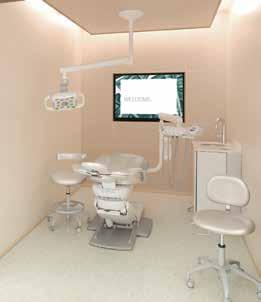
DENTIST ENTREPRENEUR ORGANIZATION • MARCH/APRIL 2023 35 dentalgrouppractice.com Limited
space shouldn’t limit your expectations—or your choices.
floor
MAXIMIZE YOUR SPACE Talk to an A-dec DSO specialist today. 1-800-547-1883 | DSOcustomerservice@a-dec.com | a-dec.com/dso © 2021 A-dec Inc. All rights reserved. WITHOUT COMPROMISE.
> Leadership
I focus not so much on the quantity, but the quality of those experiences. My Google calendar is crazy, but I’m a big believer in optimizing time. I will put on the calendar time for my kids and for my husband. We have the different color codings for kids, sports and things like that. It helps to make sure that we have that balance. I want to have the same intention that I have going into a meeting, negotiating the refinance of a practice with the bank as I have showing up for my son to take him to go paint some pottery.
Amber Nish: Whitney, I love that you called out some support at home. That was a major obstacle for me. I was the one who thought my kids were not going to grow up well cared for and well parented if I didn’t teach them to scrub bathrooms and do Saturday chores. I was working like a crazy person all week and then Saturday morning I’m fighting with my kids to get them up and doing chores because I’m going to teach this lesson. The best gift I ever gave myself was a housekeeper that comes on Fridays. The kids still have to pick up, but I now get to spend Saturday mornings with them at their events doing what we love together.
I traded valuable quality time with them, and that was a privilege that I had worked hard to earn. It was a place that I needed to be, to protect my relationship with them. I was tired of spending the few hours that I got with them fighting about cleaning up the bathroom properly.
Whitney Weiner: Amber, we talk about that too. I think it’s a beautiful
space to teach them appreciation. We say, “Aren’t we so thankful that these people help our family so mommy and daddy can be present with you?” Then seeing our boys say thank you to the people who work in our home is another special gift. I love that versus the mom guilt of, oh there’s two cars parked here, we have too much help. I’m so grateful that we’re able to do this.
Josey Sewell: I love that. It’s the same at our house. We have somebody that comes and cleans every couple of weeks and it’s my favorite day of the week because I walk out of my office and the house smells so good. I have three children. My oldest is 20, but has significant special needs … so in my home there is constant focus on Ethan. We’ve talked about needing some extra help with Ethan. My brother and his wife are here right now, and it’s such a blessing to have another pair of hands. I had to let go like you did Amber. What are my children learning from watching mom build a business and help people? They may not be able to fold a fitted sheet, but they can YouTube for that. They’ll be all right.
Jill Jenkins: It’s so interesting that you were talking about building a business and trying to balance these things. I’ve found, especially leaving a long-time partnership and starting fresh two years ago, it was a major life transition. Sharing all the ups and downs and vulnerabilities about that with my family when we’re
together I found to be such a huge learning thing for them, but then such a chance for them to support me. This was such a celebration of my family when we moved into this. I think sometimes we tend to try to do our kids’ stuff and then wait till they go to bed and have heavy conversations. We talked about it upfront, and it took a lot of that burden off of me.
I think back to when my kids were little, we had a set date night as well. And sometimes it was our three hours to argue and get it out of our system. Sometimes it was a great way to reconnect. I’m also very adamant about my time with my friends, and time for myself. Once a year I take a long weekend away by myself just to refuel and set my goals. I always calendar time with my girlfriends because I think that’s more valuable than an hour with my therapist. Those are things that we do in our family, but then also for myself.
Jenny Britt: One of my biggest struggles is we’re both extremely full-time in our careers. Having twins, we did it on our own. We are surrounded by family, but both of our families work full-time. Other than that, we’re in the middle of nowhere, so it’s not that easy to get a sitter. We’ve struggled a lot with that. At first, there was no separation between my career and my home. I’ve always given my all to my boys. As long as my five are OK, that’s my priority.
But I’ve had to learn how to say no. The biggest thing I’ve had to learn is how to put those boundaries up and understand that it’s OK to say no. Years ago, I was very much a people pleaser. I wanted to make everybody happy, and I wanted to take care of
MARCH/APRIL 2023 • DENTIST ENTREPRENEUR ORGANIZATION dentalgrouppractice.com 36
them. Whatever it was, I had a solution for it. I knew that we could figure it out. It was incredibly hard to say no.
I learned how to cut the phone off. I unplugged. Dr. Harvey tells me to do it more. He’s super encouraging from that aspect, but it’s hard for me to detach.
My boys don’t pick up their cell phones very often. They don’t do a lot of video games. They don’t do a lot of screen time because they do so much at school. As soon as I can get home and change, we’re outside, we’re outdoors, and I’ve learned how to leave my phone behind.
Amy Lee: Jenny’s story reminds me of Dr. Eric Roman when I heard
him say, “It’s going to be a ‘hell yes,’ or it’s a ‘hell no.’” I took that on a personal level. If you don’t want to go somewhere on the weekend, then it’s a no. But if you are all excited about it because your time is very valuable, then go for it. Say yes.
Whitney Weiner: It’s so hard to say no. I don’t know about you guys, but especially with so many opportunities in every direction, you get overtaxed. It’s that hyperfocus on time and being present. There’s so much power in the no, even when it’s uncomfortable. Boundaries are healthy and it seems like sometimes they’re not portrayed that way.
Josey Sewell: Absolutely. I’ve heard a phrase that the kindest word in the English language is no. These are great tips – getting help, letting go, being really intentional, setting time on the calendar, making sure you have time for yourself, setting boundaries, being outside.
One habit I’ve kept up is I will lay down with my kids when it’s bedtime. So first it’ll be with my son and we’ll read a book. Then I’ll go to my daughter and we’re talking about boys and school and girls and all of these things. Then with my oldest son with special needs, he just wants to sit and be loud and cuddle with mom for a minute.
Let’s Grow Your Practice
DENTIST ENTREPRENEUR ORGANIZATION • MARCH/APRIL 2023 37 dentalgrouppractice.com PPO Optimizations Optimize participation to produce the same amount of patients at the highest rate of reimbursement PPO Credentialing Our report to develop an optimal PPO participation strategy to achieve higher reimbursements from PPO plans. PPO Insurance Analysis PPO Negotiations Negotiate with PPO insurance companies for higher reimbursement plans.
30195 Chagrin Blvd., Ste 114N Pepper Pike, OH 44124 (877) 955-2537 fivelakespro.com
But that keeps me grounded and connected to them, even when I’m tired and I want to go to bed. I’m leveraging it and keeping it as long as I can.
A question for your younger self
Josey Sewell: One last question. What would be one piece of advice that you would share with the younger version of yourself?

Amber Nish: In my younger, very small, narrow-minded self, I believed that the one path to joy and happiness for me and the right thing for me to do was be a stay-at-home mom – the white picket fence. I never allowed myself to even imagine that I could be both, that I could have a career. Life transitioned, and it forced me to learn. It’s been the best journey of my life. So just to be able to tell myself at a young age that yes, you can’t do it all perfectly, but you’ll figure that out after you’re 30. You can have a full life with lots of different hats on and be a good mom at the same time.
Jill Jenkins: I’ll jump in. I would’ve liked to have been more curious. I have always had a good sense of intuition.
But a lot of times, because I wasn’t curious, I would get pulled in different directions, and I think if I would’ve gotten curious and asked questions, then I may have clarified things for myself a lot sooner. So don’t be afraid to get curious and ask questions.

Jenny Britt: For me, it’s don’t be afraid to fail. That’s where I have grown and learned so much, and I used to be so scared of that.
Whitney Weiner: I was going to say the exact same thing. There’s strength in failure. There’s launch, lessons, and growth. Lean into that and trust yourself and your own intuition.
Amy Lee: I was a late bloomer in school and life in general. I was always behind in reading and math and went to see a special teacher to help me get back into grade level. Because of those classes, by middle school I was on grade level, but I had this low, self-conscious confidence that I didn’t think I could achieve anything. I would’ve told myself, “Hey, you’re just late to the game, but you can achieve so much more. Just start doing and just say yes and go.” And like Jill and
Women Leaders Panel
Jenny said, don’t be afraid to fail. Keep failing and learn faster that way.
Josey Sewell: Thank you so much for sharing, Amy. I would probably tell myself that it will all make sense. It will all come together. I had a great deal of trauma when I was growing up. My dad died when I was young in a horrible car accident. It was one traumatic event after the other. Yet as I look at who I am today, and even having a child with special needs, I recognize every difficult thing that happened in my life has given me the ability to connect with other people, to love other people and to understand them.
I think it has prepared me to be the woman that I am today and the way that I show up as a wife and a mom, as a coach, all sorts of other things. So yes, I would probably just say to my younger self that it will all work for your benefit.
�Listen to our DEO Growth Secrets Podcast:
Jenny Britt is the Director of Operations for Sound Dental Partners. Jenny began her professional career as a dental hygienist in 2005. Her passion for dentistry, coupled with her business background, led to an interest in the business side of dentistry. For years, alongside clinical dental hygiene, Jenny traveled from coast to coast, learning from the top consultants in dentistry while developing sound systems for her day to day. In 2013, Jenny joined Dr. Will Harvey and transitioned into the leadership and business side of dentistry full time. One of her main goals is to take great care of people, be that her family, patients, team or business partners. Jenny is married with three boys, living in Eastern North Carolina. She enjoys anything outdoors, from gardening, reading, animals, boating and fishing. Jenny serves on the advisory board for her local Dental Hygiene Program.
MARCH/APRIL 2023 • DENTIST ENTREPRENEUR ORGANIZATION dentalgrouppractice.com 38 > Leadership

Dr. Jill Jenkins is the owner and President of Jenkins Dentistry for Kids, a pediatric specialty practice with two locations in the Kansas City area. She attended both dental school and her pediatric residency at the University of Missouri Kansas City School of Dentistry. After partnering to build her original practice of 15 years, Jenkins and LeBlanc, Dr. Jenkins expanded on her own unique skills and practice philosophy to open Jenkins Dentistry for Kids in 2020. Beyond creating a ripple of positive dental experiences and a lifetime of oral health for her young patients, Dr. Jenkins is dedicated to growing a team of dental professionals who experience ripples of joy through their own lives by working in a values driven and sustainable organization, benefiting patients, team members and the community she serves. Dr. Jenkins is married with three children and is continually grateful for the support and love of her family.

Amy Lee, RDH, sits on the executive leadership team at Burch Dental Partners, Rockford, Illinois, as the Director of Clinical Operations. She has over 18 years of clinical hygiene experience and is also a teacher, coach, and mentor, supporting 12 dental offices, from general to specialty. She is an expert at motivating an entire dental team to act on a shared purpose, resulting in better lifelong care for patients, healthier team culture, and higher cash flow for owners. Outside of work, you can find Amy spending time with her husband boating, admiring her daughter competitively dancing, and cheering her son on in his many sport activities. Amy can be reached at amylee@burchdental.com.

Amber Nish, is Chief Marketing Officer at Revolutionary Tribes, a consultancy agency that works with Dentist Support Organizations and Dental Group Practice Leaders. Revolutionary Tribes loves to help people and teams accelerate and achieve their vision. Amber firmly believes that people are our greatest asset and that by surrounding yourself with great people, you’ll inevitably get great results. As a single mom and strong female leader, she’s passionate about helping other women identify and develop their own leadership strengths. Amber currently lives in Krum, TX (go, Bobcats!) with her five children and spends much of her time engaging in fun activities with her kids.
Josey Sewell, RDH, is a dentistry expert in applying an operating system in dental groups to help them clarify their vision, focus on what matters, and achieve improved team health. She has unique expertise and the ability to weave together sound business systems and team development strategies. Her development programs have empowered leaders and executives to find more joy in their work and control of their business.

Dr. Whitney Weiner, with an emphasis on education, open communication, and tailored care, is the Founder and CEO of Whole Dental Wellness, empowers her patients and instills in them the autonomy to make the right decision for them. She does not believe in being a jack-of-all-trades like many new dentists try to be; instead, she believes in being a true specialist and ensuring her patients are always treated by the best of the best. In 2016, Dr. Weiner was chosen as one of the “Top 25 Women in Dentistry” by Dental Product Report and named the “Most Interesting Person in Dentistry” for February by Curasan.com. In 2017, Incisal Edge named her in their top “40 under 40” young, rising dentists in the country. Always at the forefront of dental technology, she attends multiple regional and national professional meetings each year.


MARCH/APRIL 2023 • DENTIST ENTREPRENEUR ORGANIZATION dentalgrouppractice.com 40 > Leadership
How Two Women Built an International CE Platform from Nearly Nothing
Navigating the difficulties of establishing a women-owned and operated tech startup.
BY SHARON ALLEN, DIRECTOR OF MARKETING, CE ZOOM
Building CE Zoom from the ground up, co-founders Sarah Thiel & Katrinna Jackson, faced many mountains to establish themselves and find success.

Lack of Funding and Investment
Women-led tech startups are often overlooked for funding and investment opportunities, leading to difficulty in scaling their business.
While venture capital funding overall has surged in recent years, the numbers haven’t leapt forward for female founders at the same pace. In 2022, companies founded solely by women garnered just 2% of the total capital invested in venture-backed startups in the U.S.1
Sarah pitched CE Zoom numerous times in the last 8 years. It takes an incredible amount of time and resources to prepare to meet with investors, only to have deals fall through.
When you’re focused on finding investors, you’re not focused on the day-to-day of building your business, which could potentially set it back. With no funding and investment but sheer tenacity, CE Zoom was built on a shoestring budget to become an incredible platform.
Balancing Work and Family Life
Women in business often face the challenge of balancing their careers and personal lives, especially when they are also mothers. There are eight women who operate CE Zoom, five of whom are mothers. In describing this balancing act, Sarah says, “Having to be ‘on’ all the time, whether I’m in mom mode or CEO mode, is equally challenging and exhausting.”
Building a strong team provides additional support when one aspect of life requires more attention. Honestly, there is no work/life balance. It’s all juggling.
The CE Zoom team recognized the difficulty of juggling career and family responsibilities and have accounted for the needed flexibility and help each other keep all the balls in the air.
Building a Support Network
A support network can influence every aspect of a startup. Strong team members, people that can make introductions, cheerleaders, and sounding boards are all part of a support network.
As a small-town girl living in a lonely world, Sarah had to go out and hustle. She went to every possible conference and endlessly networked. She talked to anyone that would listen. During this early phase, Sarah met her fan club – people who support her ideas, give critical feedback, and are loyal mentors.
Often, Sarah struggled to be taken seriously. As she built her support network, she was able to utilize her connections to gain traction in an industry where she was unknown. Her support network has been pivotal in opening doors for CE Zoom. The hustle continued for years until one day, it seemed like the entire country knew what CE Zoom was.
By persevering in the face of rejection, building a supportive team, and connecting with a respected support network, CE Zoom turned challenges into opportunities for growth and success. Finally reaching the peak and looking out to enjoy the beautiful view.
Schedule a call if you’d like to see what we’ve built: help@cezoom.com.
DENTAL GROUP PRACTICE • March/April 2023 41 dentalgrouppractice.com
Sponsored CE Zoom 1 PitchBook. (2023. February 1). US VC Female Founders Dashboard. https://pitchbook.com/news/articles/the-vc-female-founders-dashboard
Creating Positive and Effective Communication
BY LORRI DETRICK, PRESIDENT AND CHIEF OPERATIONS OFFICER, RICCOBENE ASSOCIATES FAMILY DENTISTRY

Core Values
The people in our care and those working with us to achieve our goals will only hear what they see demonstrated authentically. We need a rubric or template that clearly defines what this actually looks like, and how it is lived out in the most practical of ways. The identification, definition, and demonstration of core values are exactly that. Without such, effective communication is nebulous, if not impossible.
When we think about communication across our organizations, no matter the size, platitudes often come to mind:
> It’s important to “cascade” the information.
> Share what’s positive in public and what’s negative in private.
> There’s no such thing as over-communicating.
These are not wrong. In fact, just the opposite. Platitudes become such because they make a point worth repeating. The problem is that they are repeated so often we stop hearing, or utilizing, their meaning. At Riccobene, we have started to take a hard look at this and work to become an organization that communicates consistently and well.
Whether intentional or not, we are communicating all the time. As leaders, we are always being observed. People create stories based on the moods they perceive or what they think they have heard amongst their leaders. So, it’s up to us to cultivate self-awareness about the messages we portray and the environment we create through our behavior as well as our words.
At Riccobene, we have five core values that we’ve spent many hours debating and committing to as a leadership team: Adaptability, Compassion, Competence, Integrity and Teamwork. Intentionally listed alphabetically, they are not ranked and are equally important. They impact the way we do business, provide patient care, and most certainly, how we communicate with each other. They remind us of the effort and diligence required to build effective relationships internally and externally. They keep us focused on the tangible actions of communication.
No easy way
Even with core values, there are no shortcuts to prioritizing effective communication within our organizations. I am the worst offender when it comes to sending a quick email to the “All Employee” distribution
MARCH/APRIL 2023 • DENTIST ENTREPRENEUR ORGANIZATION dentalgrouppractice.com 42 > Communication
Ditch the platitudes and dig deep within your organization.
list and calling it good. I’ve cascaded the message. I have even spent hours crafting exactly the right message – striking the right tone of motivation and accountability, of education and explaining the “why.” But here’s what we know: only a small percentage of the organization will thoroughly read the email, if they read it at all, and an even smaller percentage will actually hear what I intended to say.
At Riccobene, we communicate through email, Teams chats (many), texting, video calls, phone calls, meetings (many) and an all-employee newsletter called The Weekly Incisor. Our leadership teams constantly consider the right talking points in order to provide consistent messaging to all sectors of the organization. We think we are pretty darn good at communicating. At the very least, we do A LOT of it.
Still, whenever we elicit employee feedback (i.e., engagement surveys, exit interviews, stay interviews, performance evaluations), we hear that we don’t communicate enough. It’s frustrating and disheartening to be sure. But in a drive to address this feedback – and remain committed to our core values – we are intentionally taking a path that goes deeper than sharing bullet points and announcements as our primary forms of communication. Much more is required.
Communication is the relationship
In the fourth quarter of 2022, we brought in a leadership consultant to meet with all the managers across the organization. Eighty team members came together for two days of professional development training centered around communication. We believe it was the beginning of a transformation that will likely take years to fully take hold, but that will pay unlimited dividends.
We practiced the how-to of effective communication. We talked with each other
about being curious, asking questions, staying present, taking responsibility for our internal opinions and attitudes, and allowing for silence, among other key concepts. Underneath it all was the revelatory learning that relationships cannot happen without communication, and perhaps more importantly, the reverse.
Relationships take time to build. Meaningful, authentic conversations are hard. Both require intention and diligence. If we do not prioritize them equally and take actions accordingly, the myriad surface-level, even important emails/Teams chats/texts/calls and meetings remain mostly unheard.
Hoping it doesn’t become a platitude
One of my favorite quotes in this realm is by Maya Angelou:
“I’ve learned that people will forget what you said, people will forget what you did, but people will never forget how you made them feel.”
I don’t want this to become a platitude. As a leader, if I communicate with self-awareness and a commitment to our core values, if I take the time to build relationships one by one with authenticity and courage, I will begin to communicate effectively. And along the way, perhaps I’ll even move the needle ever-closer toward our goals.
Our mission at Riccobene is “Changing Lives One Smile At A Time.” Dr. Riccobene consistently reinforces that this is not only about changing the lives of our patients, but our employees as well. Our commitment to communication and relationships – as intertwined and interdependent concepts and intentional action – is a journey we believe will both strengthen our organization and change lives. Hardly a platitude, it is worth every effort we can possibly extend.
Lorri Detrick is Chief Operations Officer at Riccobene Associates Family Dentistry, which operates in North Carolina and Virginia. The organization has about a thousand employees, including 120 dentists, across 55 locations.

DENTIST ENTREPRENEUR ORGANIZATION • MARCH/APRIL 2023 43 dentalgrouppractice.com
You Can’t Manage What You Can’t Measure
Use KPIs to motivate your team, keep them accountable, and aligned toward the same goals.
BY LAURA BOWLES, DEO
One of the biggest challenges dental leaders face is how to extricate themselves from the day to day micromanaging of staff/associates. When you’re putting out fires, focusing on your business growth strategy falls to the bottom of the list.
That’s why metrics are so important. Building a culture of knowing (and owning) KPIs can help motivate your team, keep them accountable, and aligned toward the same goals so you can get out of the weeds, and get time back to focus on your growth strategy.
KPIs can help reveal areas where you should focus your attention, what you need to do less of or stop completely, bottlenecks (or weak links) within your business, and much more. Metrics can assist you in decision-making by enabling you to objectively measure performance so that everything is not dependent on you reacting under pressure.
For planning which KPIs are best for your team, DEO created this resource: [MASSIVE MANAGER CHECKLIST] Critical KPIs For 9 Dental Group Positions. This resource was cultivated from our proprietary DEO MAP curriculum, the first operating system just for growing dental companies. It includes KPIs and roles/responsibilities for 9 key dental practice positions that have helped 1,000s of dental entrepre-
neurs keep their teams on track, aligned, and grow their businesses.
Here are some of the checklist’s recommended KPIs by position:
> Associate: production, supply/ lab cost per hour, and treatment acceptance
> Dental Hygienist: production per visit, reappointment percentage and the number of sealants, etc.
> Office Manager: collections, cancellations/no-shows and RPRS
> Regional Operations: P & L performance, and facility utilization
> Marketing: new patients, and Google reviews
> Treatment Coordinator: patient acceptance, and follow-ups
> Insurance Coordinator: AR days, and % of claims < 30 days
> Front Office Team: over-the-counter collections, and scheduling efficiency
By tracking the right KPIs, you can shelve emotions and opinions and let the metrics guide you – to have super productive discussions on where support is needed, plus uncover new strategies. The result: better consistent performance across the board and holding your team accountable by looking at the same exact things.
Take an example from the construction industry: when you enter a building, you take for granted that it isn’t going to collapse. Construction has systems and checklists in place to ensure this. Use KPIs to pattern your dental group the same way. If you don’t keep track of processes and goals with KPIs, you are going to have to regularly interfere in each department (and every location). You can’t manage what you can’t measure!
For more, scan the QR code to get your free copy of the

[MASSIVE MANAGER CHECKLIST]
Critical KPIs For 9 Dental Group Positions.

MARCH/APRIL 2023 • DENTIST ENTREPRENEUR ORGANIZATION dentalgrouppractice.com 44 >
MARKETING
When It Comes to Your Dental Brand, Think BIG
Make sure you develop your brand identity with future growth in mind.
BY XAÑA WINANS, CEO AND FOUNDER, GOLDEN PROPORTIONS MARKETING

“It needs to be bigger.” Normally, I cringe when I hear that request from one of our dental marketing clients, because it means they want their logo to be as huge as possible on their ad, website, or marketing asset.
While I generally discourage big logos, I’m all in favor of “big” brands. Brand awareness is important. It also takes time and effort to establish. But any time a dental practice outgrows its identity and is forced to re-brand itself, it is destined to lose its hard earned momentum and can quickly fall behind its competition.
If you have expectations of developing into a group practice (or maybe eventually a DSO), how do you create a brand now that will grow along with you? Some of the branding strategies that are commonly recommended for a single office dental practice may be things that the future multi-office practice should steer clear of.
Locations
If you are planning to open multiple office locations in the future, try to foresee how far your footprint will expand. If you are going to span more than one city, region, or state, then you may want to avoid being location-specific with your branding. Many new practices do gain significant SEO benefit from including local search terms in their brand name, but it could end up limiting you as you grow your territory.
Specialties
One of the fastest ways you’ll grow your business is to add more service offerings. While a single-office would do well to focus their brand
identity specifically on what they specialize in (even if it’s general dentistry), that could be constricting to a growing multi-location practice as it adds various specialties to its mix of services, especially if they are as widely varied as pediatrics and implants.
Personalities
Perhaps the most important change to consider is the integration of new dentists and teams into your organization. That means unique personalities and, with it, unique dental marketing DNAs to be blended into your overall branding strategy.
To allow for that, larger groups and DSOs will often treat each office location as its own uniquely branded business with a single “umbrella” brand unifying the entire group at the corporate level. Depending on your organizational structure, that can indeed be the best approach, but it’s better to start considering that early in your journey to growth, rather than trying to make a branding U-turn later.
Regardless of the direction your branding takes, do yourself a huge favor and enlist the help of an experienced dental branding agency early in the process so your brand is “big” enough, while still authentically representing who you are and why you do what you do. At Golden Proportions Marketing, we have a highly specialized DNA Dental Branding process that does exactly that. You can learn more about it at goldenproportions.com.
Xaña Winans is Golden Proportions Marketing’s CEO, founder, visionary, and lead strategist. As one of the industry’s most sought-after dental marketing consultants, she collaborates with our team on a diverse group of clients to create strategic marketing solutions with measurable results. Her passion for dentistry is evident in the work that she does, and in the award-winning products GPM produces to help dental practices thrive.
DENTAL GROUP PRACTICE • March/April 2023 45 dentalgrouppractice.com
Sponsored Golden Proportions
Living A Balanced Life

Choose each moment with purpose, knowing that it can only be filled once. BY DR.
MARYAM BEYRAMIAN, CEO AND CO-FOUNDER, WESTWIND INTEGRATED HEALTH
Today is Wednesday, and that means payroll. The team is excited about their pay week. The managers are stressed about making sure the timecards are correctly entered. And me? Well, I’m trying to see what blaring siren to address first. We are short dentists, receptionists, office managers, billers, call center team members – the list goes on and on.
We are large enough now to be targeted for poaching by the big DSOs. Maybe I should be honored that we’re finally on the map? As my day is spiraling in a way that I believe may swallow me, I turn to my regional manager, Regina, and ask her, “What are we going to do now?”
Regina looks at me and says, “Doc, you and I have been through this for the past 10 years. Nothing has changed, and nothing will change. We will continue to do this for the next 10 years, one day at time, like we always have.”
Let me tell you about Regina. She and I started my second practice
MARCH/APRIL 2023 • DENTIST ENTREPRENEUR ORGANIZATION dentalgrouppractice.com 46 > Balance
together right after I had decided that I’d been a stay-at-home mom for far too long.
Regina is a warrior. She has battled cancer several times and is currently battling all sorts of autoimmune and physical ailments.
Regina should not be at work today, nor any day, according to her doctors, but like I said, Regina is a warrior, a superwoman. She works through pain and sickness.
She has a husband that has been by her side for more than 25 years, and has two beautiful children. She is a generally happy and positive person. Even through her daily struggles, she shows up and is present. Work gives her purpose, makes her happy, feeds her soul, and gives her a reason to fight harder every day. She has grown from my office manager of one location to the regional manager of 13. She can retire because her husband can support her. She has achieved more professionally than 90% of her peers, she has grandkids that love her and want to be with her, but she still doesn’t miss a day. This is Regina’s story, and it is a story of work/life balance. It is a story of purpose and happiness, of choices and consequences. When I look at Regina’s story, I see that my story is not so different. That’s why it makes sense that we will fight on for 10 more years together.
Fighting the good fight
I wake up every day to run my group with all the struggles and silent tears. People ask me all the time questions that I find very odd: “When are you going to sell the group?” or “Don’t you have enough?”
Why it is any of their business why I don’t sell the group? Second, and more important, what does it mean when they say, “Don’t you have enough?” Enough of what exactly? Money, time, notoriety, status … life?
To stop what I’ve built and what I love will not make me happy. It’s like asking me 10 years ago to stop working and be a stay-at-home
mom. I love my children, as all mothers do, but to stay home was not a solution that made me fulfilled or happy. I needed the professional stimulation that work provided.
So this leads me to the point of this short column and the million-dollar question that is unanswerable – how to get a balance between work and personal life.
I don’t have to tell you that there’s no one right answer. But I can tell you this, I choose each moment with purpose, knowing that it can only be filled once. I give myself permission to enjoy without guilt, and live life for what it is today rather than what we need or want to do in the future, which is not easy to do when my world is in constant flux.
So how do I balance my work and my personal life? I give myself permission to choose my moments that give me happiness without guilt. I live a life that’s full, crazy, stressful, and busy. I don’t need to justify my choices for my time spent to anyone else. As long as it makes me full and complete, I’ve made the right decision for that moment in time.
Maybe this sounds selfish, but this is my way of living a balanced life. As I finish writing this article, I’m reminded that today is Wednesday, my friend’s birthday, where we are to meet for happy hour. I might not “have time,” but I want to go, so this article must end here. Goodbye, until next time.
Dr. Maryam Beyramian is the CEO and Co-Founder at Westwind Integrated Health, which has 13 locations across Arizona. Dr. Beyramian received her Doctorate of Dental Surgery (D.D.S.) from the University of Michigan in 2001 and graduated at the top of her class. Her continued commitment to her patients and profession is evident from her completion of hundreds of hours of post-graduate training in cosmetic, reconstructive, and sedation dentistry.

DENTIST ENTREPRENEUR ORGANIZATION • MARCH/APRIL 2023 47 dentalgrouppractice.com
I give myself permission to enjoy without guilt, and live life for what it is today rather than what we need or want to do in the future, which is not easy to do when my world is in constant flux.
The Best of DEO’s Growth Secrets
Can’t miss discussions from today’s DSO leaders.
Join Emmet Scott and Ken Kaufman as they interview industry leaders and distill their lessons into actionable resources on the DEO’s Growth Secrets podcast to help you create a thriving business so you can change the lives you’re meant to bless and achieve your personal success.
EP 121: How to Scale in Multiple Areas
In this episode, Emmet Scott welcomes Sarah Sharfstein, Vice President, Category Development & Strategy at Aspen Dental. They discuss how to scale in multiple areas simultaneously – what’s needed to support both clinicians and at the practice level to be successful. Sarah gives an inside view into the strategies Aspen is using to scale. She and Emmet dig deep into the challenges, potential solutions, and opportunities that come with adding specialties to any dental organization. Before joining Aspen’s leadership, Sarah spent about 12 years at Invisalign in a variety of different roles. From her experience, it was a natural transition into her role at Aspen to help develop their orthodontic category, driving its utilization in a scalable way to deliver good clinical outcomes.
EP 126: Best Practices for Collecting All Your Accounts Receivable (AR)
Ken Kaufman hosts Kimberlee Mulkay, Sales & Customer Success Manager, Abella AR to discuss “all things


AR/financing.” Kimberlee shares tips and tricks that dental groups are employing to effectively – and successfully – collect and create the best outcomes. Kimberlee and Ken touch on the importance of incorporating convenience, a variety of payment options, and payment plans to patients. Technology and software’s role in AR is also discussed, as well as many other financing topics and challenges, including how to streamline methods when scaling with de novos and acquisitions.
EP 138: Comparing Dental with Other Healthcare
Ken Kaufman hosts Julie Serewicz, CFO, Hero Practice Services, to discuss some of the similarities and differences between healthcare verticals. Hero is in six states, and has both dental and vision practices. Julie speaks from the unique vantage point of being a CFO of both practice types, offering takeaways on their complexities as well as opportunities. Ken and Julie discuss many topics, including accounting methods, P&Ls, EHR, financial metrics, and much more.

MARCH/APRIL 2023 • DENTIST ENTREPRENEUR ORGANIZATION dentalgrouppractice.com 48 > DEO’s Growth Secrets
Ken Kaufman and Emmet Scott: Hosts of DEO’s Growth Secrets
On:
Sarah Sharfstein
Listen
Kimberlee Mulkay



















Products that offer proven PERFORMANCE for Group Practice Needs! OVER 100 YEARS OF EXPERIENCE AND KNOWLEDGE LED BY: John O’Neill National Director of Special Markets 46 Years of Experience John.ONeill@voco.com The Preferred Group Practice Partner for Clinical and Supply Overhead SOLUTIONS • VOCO offers a full range of competitively-priced restorative, preventive, CAD/CAM materials and more • Reduce supply costs with products that provide crossover indications • Award-winning products that deliver proven results to maximize patient quality care • Simplified procedures to drive clinician satisfaction with innovative products • Deliver added value to your team through VOCO’s extensive and customizable continuing education options VOCO · 1285 Rosemont Drive · Indian Land, SC 29707 · www.vocoamerica.com · infousa@voco.com Call 1-888-658-2584 TO IMPROVE PATIENT AND CLINICIAN SATISFACTION! THE LEADER IN PRODUCT SOLUTIONS FOR GROUP PRACTICES PRECISION INNOVATION EXCELLENCE















 BY PETE MERCER
BY PETE MERCER












 BY JOSEY SEWELL, PARTNER, DEO
BY JOSEY SEWELL, PARTNER, DEO




 BY DR. KATHRYN ALDERMAN, CEO AND FOUNDER, NEBRASKA FAMILY DENTISTRY
BY DR. KATHRYN ALDERMAN, CEO AND FOUNDER, NEBRASKA FAMILY DENTISTRY




 By Graham Garrison
By Graham Garrison









































































